#Being a dragon as a metaphor for being a women
Explore tagged Tumblr posts
Text
December Reading Recap
It's not that late in the month! It's still January!
long-ass post cause I read a lot last month; putting it under a read more to save your dashes.
Feast of Souls and Wings of Wrath by C.S. Friedman. I've really enjoyed this series so far, which has been sitting on my shelf forever because it shares an author with the Coldfire Trilogy, which I love. I read a complaint about it that was criticizing the fact that the male characters are less well developed than the female characters, which is, to be fair, kind of true, but also the female characters are pretty great so I'm not really complaining. It's got some gender issues as one might expect from a early 2000s fantasy series, but fewer than I would've feared, and it's interesting enough in terms of the worldbuilding and story it's telling that I've put in the effort to track down the books (which aren't the easiest to find anymore). Looking forward to reading the last one, slightly delayed by my used copy getting lost in the mail.
Super-History: Comic Book Superheroes and American Society, 1938 to the Present by Jeffrey K. Johnson. I don't know why I keep reading books about superhero comics when they keep disappointing me, but for some reason I do keep doing it. Very shallow analysis and I learned absolutely nothing new from this book. I suspect I spent too much on it. Ah well.
Silver in the Wood by Emily Tesh. Me and novellas have a love-hate relationship - when I like them I really like them but a lot of times they don't work for me. I've had this one on my shelf for quite a while and was pleasantly surprised by how much I liked it. A lovely little story with the texture of a fairy or folk tale.
Seduced by Story: The Use and Abuse of Narrative by Peter Brooks. This book was interesting but not quite what I was hoping for - I wanted more of a dissection of the way that the tendency to narrativize everything can be problematic (in the academic sense) but I felt like that ended up being less the focus than I wanted it to be, and that there were fewer examples of the trend than there could have been. I think I found the first chapter the most compelling of the five, personally.
When Women Were Dragons by Kelly Barnhill. I really enjoyed this book while I was reading it and then read a bunch of critical reviews and was like. Hm. Maybe this wasn't that good after all. So I'm not sure what to make of that - either my own taste is bad or I was just enjoying the ride too much at the time to notice. I suspect the latter might be the case. Not that it was bad, but it was certainly a somewhat shallow and obvious metaphor, and I feel like the return of the dragons halfway through the book ultimately weakened the book as a whole.
Bird Box by Josh Malerman. Not my favorite work of horror but I did love that (a) everything remained unexplained all the way through to the end and (b) the sustaining of tension was impeccably done. I powered through this book in a single plane ride, pretty much, because the pacing dragged me through it without wanting to stop.
The Empress of Salt and Fortune by Nghi Vo. I've had this novella on my shelf for ages too, and while I didn't love it quite as much as I expected to based on the responses I've seen elsewhere, it was a good one, and actually felt well suited to a novella (which is sometimes my issue with them). I'm going to be picking up the sequel, when I get the chance.
Daughter of the Forest by Juliet Marillier. Apparently this past month was the month of (a) picking up books that'd been sitting unread on my shelf for a while and (b) fantasy books from the early 2000s. I enjoyed this one but wasn't overly impressed by it, on the whole; certainly not enough that I'll be picking up the following in the series, though that's partly because what drew me to this one in the first place was the conceit of the fairy tale retelling. And I will say that, of the fairy tale retellings I've read - and I've read a fair amount - this was one of the better ones.
The Hunter by Tana French. Been a long time since Tana French, and also I always forget how much I like reading mysteries until I read another mystery. Also how much I like Tana French. I really liked this one and I'm glad I finally got around to it.
Orbital by Samantha Harvey. Read this little novel on a recommendation from my father and while it's certainly not my usual fare I'm glad I did. I'm not totally sure what to make of it as a whole but just in terms of the reading experience, and the prose itself, it was a pleasure to read.
The Secret History of Moscow by Ekaterina Sedia. Yet another book that I've been meaning to read for literal years! I don't even remember when I picked it up or why, I think it was sort of an impulse purchase possibly based on a blurb comparison to Neverwhere. I didn't love it but I'm glad I read it just the same - there's definitely something about the texture that reminded me a little of Sergei Lukyanenko's books, which I remember really liking and now kind of want to reread. I wonder how hard those are to find these days.
Black Water Sister by Zen Cho. Definitely one of my favorite books I read last month. Possibly the favorite. I really liked Zen Cho's other work I've read but I think this is my favorite of hers, and definitely comes with a recommendation - also cements that I'm going to be looking for more of her work in the future.
Wonder Woman Unbound: The Curious History of the World's Most Famous Heroine by Tim Hanley. Yes, another history of comic books and another...well, it wasn't as much of a disappointment as the other one, but I still found it fell short of what I wanted, particularly in the analysis of more modern comics. The skating over of Greg Rucka's run felt particularly egregious to me, personally, and I don't think that's just because I really like it. I did learn some things from it, but on the whole found it less than edifying.
The September House by Carissa Orlando. One of my other favorite books of the month and one of the better works of horror I've read in a while - the profoundly unreliable narrator and the gradual reveal of just how unreliable is very well done. I'm not sure that the twist on the twist worked for me - that it wouldn't have been better with just the twist - but I felt the book was well done enough to earn the benefit of the doubt on that front.
American Scary: A History of Horror, from Salem to Stephen King and Beyond by Jeremy Dauber. Better than the last history of American horror I read, but still not particularly outstanding in terms of the actual analysis, and I didn't learn a whole lot that was new from my other readings on the topic.
The Bright Sword by Lev Grossman. I've not read any Lev Grossman before because I heard pretty mixed things about the Magicians Trilogy, but my sister recommended I give this one a try and I'm glad I did. I'm not deep in Arthuriana, and perhaps someone who was would feel differently (and I'm not totally sure how I feel about the ultimate antagonist choice), but I liked the way that it used lesser known/more obscure knights and I'm always a sucker for a good aftermath-of-a-collapse story. I guess that's the post-apocalypse literature fan still in me despite the fact that I haven't read much of that genre recently.
The Husky and His White Cat Shizun: Vol. 7 by Rou Bao Bu Chi Rou. I'm so glad that we've hit this point in this novel. I'm especially glad because it's now passed the point where the human translation stopped so I can actually read something that's not a (cleaned up) machine translation. But mostly I'm glad because this is the point of the story where things really get juicy (for me, specifically). As usual, the next volumes can't come out fast enough (but also please, translators, take your time).
Challenger: A True Story of Heroism and Disaster on the Edge of Space by Adam Higginbotham. I read Midnight in Chernobyl and really liked it, so I was excited to read this one and felt like I was suitably rewarded, despite being loosely familiar with the outlines of the central story. This book went more deeply into the lead up to the Challenger explosion, and how the warning signs were there for many, many years prior to the launch itself. Compellingly written piece of reportage.
Our Dogs, Ourselves: The Story of a Singular Bond by Alexandra Horowitz. I really enjoyed reading the previous book by this author, but I felt this one was a little...I'm not sure. Sentimental? Polemic? About the author's personal feelings rather than a more scientific/information angle? It was more a book of personal essays than anything else and while that might have been fine it wasn't what I was looking for.
Monstress, vol. 9: The Possessed by Marjorie Liu. Every time I read a new volume of this series I feel like I should go back and reread everything that came before. Continues to be That Good, though, and I'm going to be following this one for however long it goes, which still feels like it could either be a while or not that many more volumes. I'm not reading that many graphic novels these days but I'm happy to be keeping up with this one. If I felt like returning to my old vice (single issues) this would definitely be a series I'd follow month by month.
A Thousand Ships by Natalie Haynes. The entire time I read this book I kept thinking "The Silence of the Girls did it better" and that really, I feel like, sums it up for me. I just wasn't impressed! It wasn't actively bad, didn't contain anything that really pissed me off, but...just felt thoroughly mediocre, and I came out of it not sure what all the fuss was about. So I guess mark another Greek myth retelling down as a disappointment. (And yet, like comic book history, I keep reading them anyway.)
The Fisherman by John Langan. Two whole horror books I actually really liked this month! I've had this one on my list for approximately forever and I feel like it was worth the long wait for me to finally get around to it. I'm a little sad this author doesn't seem to have published anything else, because I would love to read more by him.
The Remaking by Clay McLeod Chapman. On the flip side, horror that was, while not unpleasurable to read, not particularly good. It was very much the definition of "fine." I don't regret the experience of reading it but I wouldn't recommend it either, and probably won't be picking anything else up by the same author.
Black Sun Light My Way by Jo Spurrier. I'm still excited about this series, currently reading the third one, sort of want to make other people read it but (a) it's not that easy to find and (b) I feel funny recommending it for reasons I can't fully articulate. But I definitely have a new terrible blorbo and a new even worse threesome ship and I'm sure there isn't any fanfic. Thank you so much @mongooseland for introducing me to this one.
---
So that's December, in books. Like I said, currently reading North Sun Guide Me Home by Jo Spurrier to finish out that series, and then I'm reading the next volume of QJJ that just came out in translation, and then I'm planning on The Legacy of Kings by C.S. Friedman to finish out that series, and after that...not totally sure. Might go back to trying to rotate through genres, but probably not. Maybe there's some more early 2000s fantasy that's been on my list for a while that I can read. We'll just have to see.
28 notes
·
View notes
Text
A rant about why Mei is my favorite “girl character”
Mei is definitely the kind of “girl character” I would have loved to see as a kid. Mainly cause girl isn’t her entire personality, She isn’t just the love interest to the main character, and it doesn’t feel like she was put in the show to be the “girl” of the group. And they did it without making her “not like other girls” which is something many writers (cough cough YA authors) struggle to do.
They also gave her a storyline (season 1 episode 3 Coming Home) that’s very relatable to girls like her who aren’t super fem. They explain in the episode that she feels like her parents want her to be something she’s not, a noble member of the dragon clan, and she’s never been allowed to “ruff and tumble” like the other kids because of expectations put on her to be prim and proper. The message in the end is that her parents still love her even if they don’t see eye to eye and that she can embrace her family history (and her womanhood) in her own way.
My parents were feminists who didn’t really push gender roles and yet throughout my childhood even I felt the pressure put on girls to be feminine. It was in my favorite shows where I felt I had 1-2 options for who I could see myself in even in a cast of 5-7. It was in the way I was told by adults to sit properly. It was even in the way I was dressed, the way other kids saw me. As I got older I felt as if my femininity, my girlhood, was some expectation I couldn’t meet rather than a part of me. When Mei picks up the dragon sword and looks her ancestors in The eye she says “I am a descendent of the Great Dragon of the West Sea and no one gets to choose what that means for me but myself.” I feel like that is a wonderful message for young girl who has had there femininity questioned or who feels like they don’t meet the standards for girlhood. Mei says you can be a girl however you want to be a girl and I love that.
#lmk#lego monkie kid#lmk mei#lmk long xiaojiao#long xiaojiao lmk#mei lmk#feminism#women in media#Girls#Being a dragon as a metaphor for being a women#Bet you’ve never heard that one before#Also I acknowledge that being a dragon is also a metaphor for living up to your culture#It can mean multiple things#I love Mei
12 notes
·
View notes
Text
just felt so seen by a novel that i started bawling my eyes out when i finished reading it
#when women were dragons#i got to the part where alex watched the prom girls become dragons and something broke in me#it was the feeling like everyone else was moving on and im not that did it to me#the why am i not like the others#and the part that alex always go by alex and not alexandra and just#i know that wasnt the point of the book but it also feels like it is#being agender and probably autistic/neurodivergent just...made that hurt a lot#the i feel so alone no one understands me just felt...god#this was both the worst and best time to read this book#i feel like i finally found a way to put how i feel into words#when i have to bring up how ive been feeling tomorrow at my online therapy appointment#its just. a good metaphor for it rn#and the “dont go youre all i have left” feeling with alex and beatrice just really. god#knowing things wont change horribly but also feeling like they will#(i was actually still crying when i started writing this post)#( mage.txt )
2 notes
·
View notes
Text
Butterfly ࿐ྂ Kinktober. 12, oct.

— pairing: Helaena Targaryen x brothel worker!reader x Aegon II Targaryen
— type: smut, Kinktober (House of the Dragon Edition)
— kink: scissoring + voyeurism
— summary: You are Aegon's favorite prostitute and finally meet his wife during one of your special visits to the Red Keep.
— word count: 4.4k
— tags/warnings: kinktober 12th day, Targcest (older brother/younger sister), female!reader, Helaegon, throuple, scissoring/tribadism, voyeurism, praise kink, nipple licking, referenced cheating, overstimulation, crying, sexual tension, breast worship, body worship, curse words, Madam Sylvi mentioned, Aemond Targaryen mentioned, minor Helaemond, past underage sex, bathing/washing, animal metaphors, bisexual!Helaena, sex worker!reader, voyeur!Aegon, switch!Helaena, sub!reader, dom!Aegon, canon divergence (no Dance of the Dragons/War for Succession), porn with plot. no use of y/n. english is not my first language.
— tagging list: @baybaybear1 @blessedbymoon @p45510n4f4shi0n @lina-lovebug @moonnicole
— crossposting: AO3

It was not uncommon for King Aegon II to bring prostitutes to his castle. As much as he loved the loud and disgusting chaos of the brothels, sometimes he needed to maintain what little dignity he had left and regard discretion.
You were Aegon's favorite prostitute for everything, including those more... Calm situations. He had met you a few days after his coronation, that day he went to the brothel and asked Madam Sylvi to recommend a younger girl who was not as experienced. He needed the feeling of being with someone cleaner, more innocent, something he was far from being.
Aegon could not say if this demand was because he just wanted to feel less dirty, or if it was because he also wanted to corrupt someone. Both, perhaps.
You were still starting out in that new life and Sylvi saw you as the perfect choice for Aegon. Even though you were not a maiden anymore due to the two weeks working there, your lack of experience before all of this was enough for you to be scared by Aegon's aggressiveness, but it was also enough for him to see you almost like a pretty flower to be protected and cared for.
When Aegon left after cumming, you noticed a few extra coins, as well as seeing him having a serious conversation with Madam Sylvi. You did not know what they had actually talked about, but you noticed the number of men looking for you had dwindled. Which would be completely bad if you did not start being spoiled by Aegon every time he came back there. He would give you more money, sometimes he would bring you some tasty candy made by the best cooks from King's Landing, and sometimes he would even give you random pieces of jewelry. You had to constantly deal with the looks of envy and disapproval from the other prostitutes, despite for Sylvi to keep the situation under control, always arguing about not being able to go against the King's wishes.
Aegon still slept with other women. However, they did not receive tips, much less gifts. Sometimes you even believed he fucked them just so the rumors that he had a favorite whore would not spread.
Then, whenever Aegon slept with another girl, you noticed that he became less aggressive during sex, almost more submissive to you, as if he wanted to compensate. He was extrovert and funny with the people around him, saving his more quiet and almost melancholy side for you and only you. He did not use to talk to you much other than dirty obscenities, enjoying the silence that followed after the sex was over.
Whenever he handed you an expensive gift or a tip that was much larger than expected, you could not help but widen your eyes and he would just shrug and make a mockery about how you needed it. Behind the sarcastic facade, you saw his eyes shining, as if he was enjoying seeing your cheeks flush in gratitude.
It was not long before Aegon began to trust you to visit the Red Keep and pleasure him when he could not go to the brothel. You went through a series of checks before entering and after leaving there. Upon arrival, the Royal Guards always checked that you were not carrying anything that could put the life of the King or any other member of his Royal Family at risk. When it was time to leave, the guards checked to make sure you had not stolen anything. Aegon hated it when he had to argue with the guards and reassure them that the large amounts of gold or some jewelry or dresses had actually been given to you by him, not stolen. He did not mind when they did that to the other girls from the brothels, but he hated it when his men suspected you of being a gold-digging thief or a murderer and put you through all that humiliating stress.
And he hated it even more when he realized that the guards took advantage of those moments to caress the curves of your body or make dirty jokes.

Normally, you spent a maximum of two days in the Red Keep. Arriving at dawn and leaving two moons later. However, Aegon had paid a huge sum to Madam Sylvi to allow you to stay in his castle for two weeks. You did not know exactly what all this was for, but you did not dare argue when the guards escorted you to the private chambers.
"Finally!" Aegon snorted when Martyn and Leon opened the door. "You can leave us alone now." He warned, as the two men nodded and closed the door. "Any scratches? Did they grabbed your arm like the last time?"
You shook your head, looking around the chambers he brought you and noticing that it was a little bigger than the last one. Or at least the bed seemed much bigger.
"Did they make any joke?" He asked, looking you up and down, staring at the robes you wore with disgust. Gods, he so wanted to put you in a beautiful green velvet dress...
"Just the same things as always, My King." You shrugged.
"Aegon." He corrected you little impatiently and almost... Shy. "I have already ordered that you must call me by my first name when we are together and alone." You smiled slightly at his words and nodded. "Fuck, these rags are ridiculous."
You looked at your own clothes, feeling a little embarrassed as you pictured the difference between that cloth and the expensive and perfect dresses that Royal Ladies were supposed to wear. You did not really know what to say, even though you already knew Aegon well enough to realize that was his way of saying that you deserved to wear something prettier.
"You are being very rude, Aegon." Your eyes widened as you heard a sweet calm voice sounding from the door inside the chambers that led straight to the room where there was a bathtub and anything needed for a decent clean.
As much as you knew that Queen Helaena was indifferent about her brother-husband's extramarital affairs, it was still a surprise for you to see her so calmly entering his private quarters, the transparent nightgown leaving her voluminous hips and full breasts on display. You wondered to yourself if she was used to dressing like this frequently in front of Aegon after so many years of marriage, as even he seemed a little confused and focused on her appearance.
"My Queen..." You bowed awkwardly, unsure of what else you should do or say. Helaena was not jealous and did not even feel bad about the King's infidelities, however, you could not help but fear that she would get angry for some reason and send you to the gallows.
Even though she was so dear and sweet to the commoners, she was still a Queen who could turn on you and end your life quickly if she so desired.
"Just Helaena, darling. Or Hel. Aemond used to call me that, although he has not done that for a few years now." She rambled on about the nickname her other brother used to call her, and although you chuckled at the situation, Aegon pinched the bridge of his nose, trying to hide the arousal inside his pants at seeing his wife wearing such a revealing nightgown. Despite six years of marriage, he could count on one hand the number of times he fucked Helaena without it being pure duty or sacrifice.
"Helaena, I told you I would have a special guest here at the Red Keep for two weeks." He practically growled, looking at her indignantly.
"I know. That's why I am here." The Queen smiled and approached you, looking around you and touching the strands of your hair, as if she were studying every inch of you. You feared that she would do it with a malicious or mocking way, but Helaena actually seemed very enchanted looking at you. Aegon remembered her younger version, watching her favorite stupid caterpillars with the same fascination she showed now. "I really wanted to meet you. Aegon always tells me that you are the most beautiful woman in the Seven Kingdoms."
You parted your lips with complete shock at her statement. You did not know what shocked you more, the fact that Helaena was not angry about those words or the fact that Aegon would actually say something like that. About you. A whore.
"What the hells? I never said that!" The King tried to defend himself, his rosy cheeks highlighted before his bright violet eyes.
"Oh, you did. Every time you need my help to picking out a dress or some jewelry to give her." Helaena teased and you laughed lightly, catching Aegon's attention. He was stressed about how his wife was exposing his secret side and at the same time he was intrigued by her sudden interest in you and the way you seemed so soft interacting with her.
"I may have said that once or twice... When I was drunk." Aegon gave in a little bit, still omitting the part that he was perfectly sober in all the thousands of times he said anything romantic about you. He did not even need to look at you to make sure you were smiling at him.
Helaena's hands ran through your hair again, playing with the strands and laughing innocently when she noticed your neck getting goosebumps with her touch, something that left Aegon's heart strangely racing. He was not the best person to make Helaena smile. In fact, he was not the best person to make anyone smile.
But here you two were, giggling like you had been confidants for years. As if Helaena was not his wife and as if you were not his favorite affair. As if there were just the two of you inside the chambers, without him or any man to disturb the female connection between you. He felt almost jealous. Almost.
"Helaena, can you help her take a bath, please? We have to have lunch soon." Aegon asked his sister-wife, patting her shoulder gently. It must not have been a very common act coming from him, because Helaena flinched for a few seconds, before frowning and nodding. Then, he turned to you. "I will be waiting for both of you at the dinner table. Do not be late."
Despite the King's severe tone, you blushed at the realization that he was allowing you to join them for lunch. In the hall. Not like he always did when you served him there, just bringing the banquets to the chambers so you could enjoy some nice food before and after sex.
As soon as Aegon left, Helaena turned to you with an excited smile on her face. "He likes you."
You frowned, shaking your head and trying to hide the blush on your cheeks. "But not the way you think, Your Grace." The words came out embarrassed and a little strained, but Helaena stood her ground, even without arguing with you. She took your hand, not looking disgusted or anything like that, and led you to the door where you had seen her appear. The room was quite large and had a favorably large bathtub, already with some warm water inside, buckets and soap around.
You glanced at her, wondering what you should do next. Just get naked and get in the water? Wait for her orders? When you opened your mouth to say something, a sigh escaped while Helaena moved behind you, her soft hands undoing the weak worn lace of your dress. As it fell to the floor, she looked confused at your lack of underwear or a corset, only realizing the reason behind that when you cringed, both from the sudden cold and from embarrassment.
Not wanting to fill you with awkward questions with obvious answers, Helaena helped you into the bathtub, her gaze lingering on your submerged breasts and the shaved hair on your groin. "Do you always... take it off?"
An uncomfortable silence fell over the room as you thought about your shaved cunt. You looked at yourself underwater for a few seconds before answering. "Yeah, I do. Madam Sylvi sometimes requires us to remove all the hair from here, because many men like this."
Helaena nodded, for the first time in her life hating the silence that followed an answer. By the way your back was tense when you leaned against the bathtub, she knew she had asked an impolite question. She had not meant to ask about brothel customs, she was just genuinely curious, since she had never considered plucking the blond hair she had on her private parts. They were so pretty and soft, and during the few times Aegon slept with her when he was drunk, he always made some comments about liking them too.
"You should let them grow. Aegon does not mind, he likes them, actually. Seeing them shine when I manage to get wet." Her statement made you look at her in disbelief as you sighed and began to scrub your arms with the sponge that was there next to you. Being a prostitute and being jealous of your affair was not uncommon. But being jealous of both your affair and his wife was absurd. "Did I hurt your feelings?"
You swallowed hard, scrubbing the sponge rougher on your own skin. This was pathetic. Aegon liked Helaena's pubic hair and you were jealous of that, even though you knew they almost never had sex and you were just his whore.
And deep down, you also felt a pang in your chest as you pictured what her cunt must look like and how much Aegon must like it, despite everything. You did not even know her well and you had been fucking her husband for a long time. Gods, you really were irrational sometimes.
"No. You did not hurt my feelings, Hel." You considered calling her My Queen, thanking yourself for changing your mind when you saw her beautiful smile. Helaena watched you bathe, your own hands scrubbing every inch of your body as you tried not to be intimidated by the Queen there by your side. "Do you always do that?" The inevitable question finally took over the messy thoughts inside your brain and you allowed yourself to ask. "Being so lovely with the King's whores?"
It was a dangerous question, a dangerous ground. Being arrogant towards Helaena was not fair. She was being kind and thoughtful, and she also seemed to be enchanted by you. And that was exactly why you were so fucking upset. Would she take a dagger and stab you in the throat if you did not pay attention to her every move?
As rude as you sounded, Helaena did not seem bothered, she stroked your hair again, smiling slightly, her big violet eyes shining with the moisture now hiding from your strands. "No, I do not. I never cared to meet them. But now you are my favorite. And Aegon's favorite too."
Her revelation made your brow furrow, your legs tightening as she touched your neck with her fingertips, studying you as if you were one of her favorite insects. You reminded her of one of the green butterflies she had collected during her childhood but Aegon stepped on when he was drunk, leaving their chambers after consummating their marriage from the first time. It was her favorite butterfly and she had never found one so beautiful as that one. Until she met you.
"Renewal and freedom." She murmured, touching that same sensitive spot on your neck that made you shiver for the second time.
"What does that mean?" You muttered a little alarmed, which made Helaena blink several times before frowning.
"Nothing. I do not know if it's important now."
You let the silence appear in the room again, breaking it only when you noticed how Helaena was staring at the sponge you were rubbing on your stomach. The violet eyes were full of expectation, as if she was yearning for something. Wanting to test your theory, you lowered the sponge to your smooth core, seeing how Helaena became panting and turned her head to stop staring at you. The way she stood up with flushed cheeks made it clear what she was picturing.
"I should get out of the tub now." You said with a soft voice, a hint of a smile on the corner of your lips. Helaena nodded quickly, passing you a towel and doing her best not to admire your body. It was torturous, to say the least.
As soon as you toweled off and wrapped yourself in the towel, the Queen guided you back to the chambers, and you were both a little surprised by the presence of Aegon lying on the bed, arms crossed over his chest and a frown on his face. "You women were taking your time. I waited like an idiot at the table." The King practically growled and you flinched, making him take a deep breath to control himself, knowing it was unfair to take it out on either of you now. Helaena was enjoying your presence and you never had many opportunities to take such a long complete bath.
Still wrapped in the towel, you faced Helaena and Aegon, noticing the couple exchanging some intense looks, as if they were communicating like that, almost reading each other's minds. Aegon sighed with frustration before muttering. "Helaena is horny for you." He revealed it without hesitation and you almost choked, a look of pure shock appearing on your face when you turned a little to see the Queen's reaction, who shifted uncomfortably, but without denying what her husband had said. Quite the opposite, you noticed how her nipples became more pert under her nightgown. "I suppose brothels do not get female customers very often."
Aegon's mockery did not go unnoticed, and you stopped yourself from rolling your eyes. "Very rarely do we have the opportunity to serve pleasure to women."
Helaena became even more turned on after your information, while Aegon clenched his jaw and clenched his hands into fists when he thought about what you needed to do to survive, after all, that was how he met you. But that did not make things any easier for him to accept. You should only be his. At least if he was not the damn Lord of the Seven Kingdoms...
"So you have slept with at least one, right?" Helaena asked with quite a surprising amount of excitement and you mumbled in response. "Yeah, but two or three times at most."
"It's enough to know something, I guess." Aegon grumbled, his arms remaining crossed. The King pondered his options for a few minutes before snorting when he saw clear excitement on Helaena's features. "How much more gold do I need to pay you for you to... Serve my wife?"
You broke eye contact with Helaena to look at Aegon, stuttering like a stupid woman until you managed to utter concrete words. "That will not be necessary. You have already paid me enough to be here for the next two weeks." Then you turned your gaze to the Queen. "Have you... been with women before?"
Helaena's pale cheeks flushed and she nodded, making Aegon scoff at her reaction. "Do not play coy now, wife." He practically growled. "Helaena is not as chaste as she makes herself out to be. Although she rarely beds me, she finds enough distraction with a few ladies-in-waiting... sometimes Aemond."
You let out a surprised sigh, the exchange of barbs between the King and the Queen Consort not something you expected to experience in person one day. But here you were, practically torn between the two of them, both hungry for you in different ways. Aegon moved to the corner of the bed, making room for the two women to sit next to him.
There was another moment of silence. "You will not... Stay closer?" You asked Aegon, your body still damp from the bath and wrapped in the towel, being quite a sight for any being who was attracted to women. However, Aegon shook his head, a light smirk on his lips. "Oh, that will not be necessary for now, darling. I will let my dear sister-wife enjoy you. Today I will just watch."
Your attention turned to Helaena when she touched your cheeks, enchanted by the sight of her eyes shining at you. Aegon gasped when Helaena did not hesitate for another minute. She put her hand on the back of your neck and pulled you closer, placing her lips on yours, the softness of her mouth making the kiss much better, her tongue exploring yours delicately, something different from Aegon's typical anxious despair. Helaena was kissing you like she wanted to never let you go again, while Aegon always kissed you like he was too scared to let go. There was a difference between being intense and being needy. And you loved both types.
Without breaking the kiss, Helaena carefully pulled the towel from your body, throwing the fabric on the floor and moving her hands to your breasts, the drops of water still wet on your skin. She moved her lips down to your collarbone, licking the wetness and squeezing the flesh of her breasts, careful not to press your nipples too hard. You gasped her name, tilting your head back, sighing in surprise when Aegon placed your head on top of his thigh, stroking your hair as if you were a cute kitten.
"Does not she have a perfect body, dear wife?" Aegon teased Helaena, staring at the woman licking your breasts and nodding, the hint of a mischievous smile when she nibbled on your nipple, sucking the bud gently with mock apology. You tried to lift your head from Aegon's lap so you could sit up and undress Helaena, but Aegon held your head down and Helaena let out a giggle. "Do not worry, darling. I can do it myself." She assured, taking off her nightgown. Yours and Aegon's attention turned to Helaena's perfect body, her milky white skin, her full heavy breasts, her soft belly, her thick thighs that perfectly matched her wide hips. She was a divine sight for both of you, and Aegon had to restrain himself from letting his lust get the better of him. He wanted to touch Helaena. He wanted to touch you. Aegon wanted the two girls for himself, but he also knew that Helaena deserved a little fun. Even if he did not admit it so desperately, he wanted you. He needed you. And Helaena was the only pure soul who would never try to steal you from him. Just share, perhaps. He could handle this, if it was only Helaena. He trusted her.
"You should enjoy it while her cunt is still wet from the bathwater." Aegon suggested and he saw Helaena's eyes darken with desire. She nodded quickly, parting her legs carefully. You and Aegon only had a few minutes to admire the sight of her swollen blond-haired cunt before Helaena fitted it into yours, causing you to moan and echo through the chambers. "Shhh..." Aegon whispered with amusement, loving watching you melt so easily at the mere sensation of Helaena's cunt against yours. "Just relax, darling. These two weeks here in the Red Keep will be my gift in honor of your birthday."
Your eyes widened at the mention of your special day. During the weekly rush at the brothel, you had forgotten that you were about to celebrate another year of life. But it was obvious that Aegon would never forget and had probably threatened and paid Madam Sylvi a long time ago until she told him any little detail about you. He needed to know everything.
You did not even have the breath to thank the King, all your mind could now focus on was the feeling of Helaena's luscious cunt rubbing against yours, the slick sounds filling the chambers. She also let out some moans, which were lower than yours, but which contrasted with the intensity with which she held your waist with one hand and kissed yout calf.
"Such delightful sounds... I bet your cunts are completely creamy right now." Aegon groaned to himself watching the scene, caressing your hair as Helaena's breasts bounced when she increased her speed, as if wanting to prove how wet you two were. He laughed, understanding very well. "Seven Hells, Helaena..." Aegon growled, mentally thanking the Gods after you raised your hand to squeeze one of the Queen's breasts, the soft mound compressing and spreading in your fingers, earning more breathless moans from her.
"I am going to cum..." You warned with a desperate whimper, looking back and asking permission from Aegon, who soon nodded. You moaned Helaena's name loudly, reaching your release and feeling your vision became blurry and your legs tremble. Helaena took advantage of your cum to rub herself faster, her clit almost hurting yours, now so sore and overstimulated that Aegon chuckled as he wiped the tears that ran from your eyes. When Helaena came too, she gasped and lay on top of you, your hands squeezing her ass without so much pressure, just enough to try to calm the spasms of your body.
Aegon smirked at the sight of Helaena's large breasts pressed against yours, both practically crushed by each other. The Queen gave you many kisses on your face, telling you praises, thanks and apologies that you could not respond verbally, but smiled and closed your eyes, your hands still caressing her ass. You felt Aegon kiss your forehead and then you heard sighs and wet noises, noticing an intense exchange of kisses between the married siblings.
"I love green butterflies." Helaena's breathless declaration made Aegon chuckle softly, using his other hand to stroke her silver hair.
"I know that..."
You snuggled with your head still on Aegon's thigh and brought your hand up to caress Helaena's sweaty bare back. "Can we have this one if you promise not to kill her too?" She asked in High Valyrian, knowing you would not understand anything.
Aegon frowned, both because of his little knowledge of the ancient language and because of the memories that his sister-wife's words brought to him, the strong implications behind them. He never wanted to kill that stupid green butterfly years ago. It ran away from the vase without Helaena noticing, it was in his way and he just... Passed over it.
"I will try my best." That is all Aegon said in the normal language. You were now Helaena's favorite butterfly from her collection, the only one Aegon liked. And he would not make promises without knowing what the future held for each of the three of you.

HOTD Edition - Masterlist
Criminal Minds Edition - Masterlist
Venusbyline's Kinktober 2024 - Masterlist
#venusbyline#venusbyline's kinktober#kinktober 2024#kinktober#helaegon#helaegon smut#helaena and aegon#aegon and helaena#aegon x helaena#helaena targaryen#helaena targaryen x reader#helaena targaryen x you#helaena targaryen x female reader#aegon ii targaryen x reader#aegon targaryen fanfic#aegon targaryen smut#aegon targaryen x reader#aegon ii targaryen#hotd aegon#hotd smut#hotd x reader#hotd fanfic#house of the dragon#helaena targaryen smut#aegon x reader x helaena#aegon x reader#aegon targaryen x female reader#aegon targaryen x oc#smut scenarios#my writing
765 notes
·
View notes
Note
do you have any thoughts on daenys the dreamer?
extremely fun and obvious play on the cassandra figure. a version where her family not only believes her but venerates her visions and prophecies—like, she saves them and a handful of dragons and, in doing so, the world, but it also curses her bloodline. the thing that once saved them becomes an obsession that consumes them literally in wildfire. the idea that you can be doomed by believing in and actively trying to fulfill a prophecy (aegon v at summerhall, melisandre and stannis) just as easily as others are doomed by their disbelief or their attempts to circumvent fate (cersei echoing my buddy king laius)—like that’s so, so cool to me. i love the ambiguity between fate and choice, the way grrm takes the whole trope apart and plays with all the individual components.
also very interested in the line running from daenys to daenerys, and i always wonder if daenys saw her too and if so, how much of her life daenys saw and was able to contextualize? did she see clear images like melisandre and bran or more metaphorical ones, like jojen or dany in the house of the undying? something like… a dragon with three heads fighting in a frozen wasteland lol?
considering the the loss of female power in house targaryen is so deeply entwined with the dying of the dragons, underneath all of that for me is aemon’s line in affc and the context that follows it:
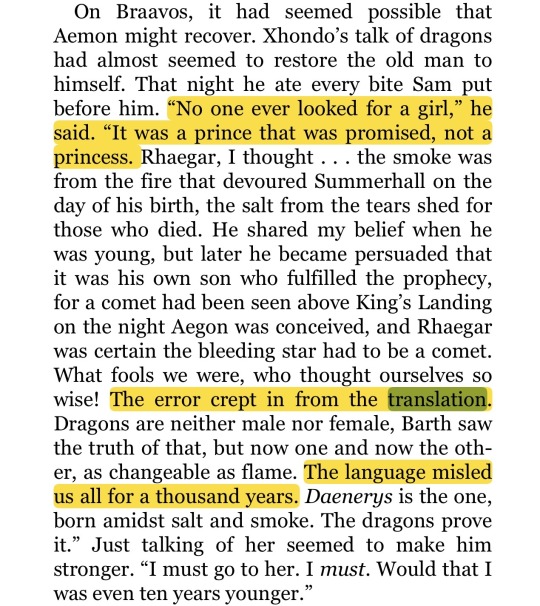
what were they translating?? were some of the documents in other languages? it couldn’t have all been daenys’ works because aemon says they’ve been wrong for a thousand years. this prophecy has been a motivating factor for the targaryens (and valyrians?) for a thousand years, but i wonder at what point the translation error actually crept in? daenys was valyrian and that would’ve been her primary language—i like to think she would’ve understood the nature of the dragon in a way her male descendents couldn’t. no one ever looked for a girl, but it was always a girl. not men in a patriarchal feudalist society reducing women to their reproductive capabilities (rhaella’s miserable life being one of the most egregious examples of this) and then being surprised when a woman is needed to rebirth the dragons lol.
this got away from me because i think the (deconstruction of the) use of prophecy in asoiaf is fascinating and everything we know about daenys is tied up in that. cutting myself off before i start talking about gender as it relates to this prophecy. beyond that, i’m really not interested in interpretations of daenys where she’s catatonic or broken by what she’s seen any more than i am in interpretations of dany where she goes mad, just because i’m sick of the seeing the general victimization of women in asoiaf taken to such an extreme that they’re defined by it—with whoever suffers most ecstatically being the least problematic to stan, especially when the women in question are from/associated with house targaryen.
#me every time i get an ask: this got away from me ajdjsks#daenys the dreamer#also aemonnnnn 😭#i really need to do a reread bc i couldn’t remember where we find out he says this#also notice me not mentioning rhaegar re: the prophecy obsession#i think he was actually pretty normal about it considering literally everything about his his life from the moment of his birth#asoiaf
271 notes
·
View notes
Text
What is the gender spilt of the murders in NBC Hannibal?
This is the third of three posts though this one works as a standalone, the first two are about the characters saying each other’s names and can be found here and here (I promise they are much more interesting than that summary makes them sound….) I decided to make this post because of this quote from Bryan Fuller; “And we are very conscious in the writer’s room; ‘Okay we just killed a woman, we have to kill a guy now.’” (47:20) And I always wondered how well they actually managed to do that…. thus I went out and collected the data and here it is!!
Adding a quick disclaimer that I did this for fun so I haven’t double checked it meaning there may be some mistakes!
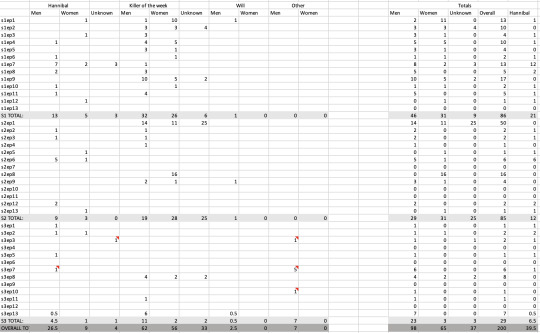
As you can see from the data it turns out that they did kill less women than men during the show!!!! The total known kills in the show are 200 with 98 of them being men, 65 women and 37 were unknown!! I also kept track of who did the murder and those categories are: Hannibal, killer of the week, Will, and other.
To preface, I am only using “women” and “men” for my categories in this data as the show does not depict any trans or nb people (explicitly at least, there are a couple metaphorical/subtextual ones…) and if I could not tell the person’s gender or I simply did not see a body I categorised them as “unknown”
You will be pleased to know that Hannibal killed 39.5 people (the 0.5 is Dolarhyde which I split between Will and Hannibal as it was a joint kill 😌) over the show on screen and that 26.5 of them were men, 9 were women and only 4 were unknown! All I can say is that Hannibal is a feminist queen! That or women are significantly less rude in the Hannibal universe… although Freddie seems to defy that theory…. He does kill the most in s1 at 21 times! That essentially halves in s2 to only 12 times and again to 6.5 times in s3.. although it’s worth noting that I was unable to count his kills at Muskrat Farm as we don’t see any bodies on screen (though the script implies it was at least 7) and I only counted the Il Mostro kills that we saw evidence of instead of including the amount killed by the actual Il Mostro killer(s).. Not to mention that he spent half the season in prison! So all that said he did okay! Also I personally believe that his kill count across his lifetime is easily in the high hundreds, he has to meal plan if nothing else so let's put some respect on his name as Hannibal THEE Cannibal!
Unsurprisingly the killers of the week did make up most of the kills in the show, and killed 62 men, 56 women and 33 of unknown gender altogether. The killer of the week who did the most murder is James Grey at a whopping 50 but he did have a mural to create so that takes a lot of bodies! Second place goes to Lawrence Wells who murdered 17 people over his lifetime to create his totem pole, while Clark Ingram sneaks in at 3rd with 16 murders, although he only killed women and is the main reason why the women’s s2 kill count is higher than the men’s, boooooo! Poor Dolarhyde had to pick up all the slack in s3 as the only killer of the week but he did at least get 15 kills in! Sadly he was bound by the orders of the moon and could not do the suitable legwork 😔
Now Will DID get his own section of the table as is his right as the main character 😤 even if he only killed 3 people (which translates to 2.5 on the table as a result of having to share the dragon with Hannibal…). But they were all monumental kills, I mean Garret Jacob Hobbs haunted the rest of the show, Randall was turned into a magnificent tableau, and Francis was the culmination of his becoming and gave us That Ending!! It’s also not like he didn’t successfully manipulate multiple people into killing (or almost killing) people so I think he deserves extra points for those if only in our hearts!! Despite his low kill count he is the character we see commit murder the most on the show! He fantasises/imagines/hallucinates murdering 32 people across the show!! As the show moved away from the procedural nature he imagined killing less people; with s1 standing at 16, s2 moving down to 9 and then only 7 in s3! Just because most of the time he’s empathising with killers to recreate their kills doesn’t make the scenes any less sexy or iconic!!
The 7 other kills actually all come from women!! Another feminism win!! 3.3 is when Chiyoh killed her prisoner after being manipulated into it by Will. 3.7 sees Chiyoh kill again, this time’s it’s the 2 guys who were going to kill Jack and the 2 guards at Muskrat Farm, where we also we get Mason’s murder from Alana and Margot!! Then in 3.10 we get the flashback to Bedelia killing her patient! Go Girls!! Whooo!!
In conclusion no one is surprised that there is a lot of murder in this show and Bryan Fuller while not exactly alternating each week in killing off each gender did not kill more women than men so arguably achieved his goal!
(part 1) (part 2) (part 3)
#hannibal#nbc hannibal#Hannibal Lecter#Will Graham#hannibal meta#hannigram#data#my post#Francis Dolarhyde#Chiyoh#Alana Bloom#Margot Verger#Bedelia Du Maurier#hope people found this series interesting!
70 notes
·
View notes
Note
Hello👋
Do you have an opinion or analysis of Johan from Yu-Gi-Oh GX?
I love his Character💕
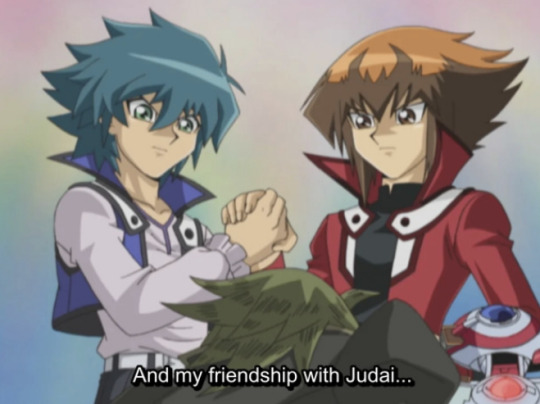
My opinion on Johan is I love him lots. The only reason I didn't include him on my previous season 3 posts is that there's so much to talk about with Johan he basically requires his own post. Johan is just as important to Judai's development in season 3 as Yubel, both alchemically and thematically.
So let's embark on another long, long post for Johan and his role in the story.
The Golden Shadow
Before we deep dive into alchemy let's talk about Jung. Jung's theories of analytical psychology is heavily based on Alchemy so this is relevant, I promise. Freud and his contemporary Jung both pioneered the field of psychology together, however Jung went deeper and believed that re-occuring character archetypes and motifs in stories told us something about the human subconscious itself.
For Carl Cung, "the rediscovery of the principles of alchemy came to be an important part of my work as a pioneer of psychology". Jung linked the steps of alchemy several a process of turning lead into gold as a metaphor for individuation.
Individuation is essentially becoming one's self. Jung believed for a person to be whole, they had to integrate all the parts of their personality. His model divided personality into the the persona (the face / exteral world) shadow (the internal / the subcosnscious where everything's hidden), and the anima and animus made of feminine and masculine traits.
In a show like Yu-Gi-Oh GX, individuation is the process of growing up. Jung used alchemy as a metaphor for a developing person's ego maturing, each stage representing a different aspect of his divided conscious. Nigredo is where we become aware of our shadows, Albedo refers to the anima and animus, citrinatis is where sophia the wise old man or women appears, and rubedo is where the self becomes whole.
Johan however, represents two concepts I've left out. Sometimes alchemy is not four stages, but rather five.
The fifth stage is the Peacock's tail, which appears when a person receives a flash of inspiration. Unlike other stages of alchemy associated with color, Peacock's Tail is referred to as the prismatic stage, associated with the colors of the rainbow. The connection to Johan who's signature card is the Rainbow Dragon is obvious.
More on the prismatic phase in the second half of this power however. For now all you need to know that like the star card in Tarot, Johan is a dazzling light of inspiration that helps kickstart Judai's development. The way he does this is by giving Judai someone to aspire to be like.
If the process of aclhemy is to create gold and become your best self then Johan is the golden shadow, to Judai. His role in the story is to help guide Judai into being his best self.
While the shadow is made up of parts of ourselves we hide from others, sometimes these are positive qualities. For example, a character with low self-esteem like Sho Marufuji constantly put himself down and therefore he's never able to see his good qualities because all he ever focuses on is how he's lackluster in comparison to his brother.
If Yubel represents the worst of Judai's flaws that he must learn to accept so he can learn to love himself in spite of those flaws, Johan represents the best in Judai. While Judai has many flaws that are glossed over in the first two parts of the show, I'd also argue he doesn't experience any positive growth. He's entirely stagnant as a character, which is why I say the opening to season 3 and the immediate introduction of Johan is what kickstarts his development.
The banner image I used for this post is where Judai and Johan are doing the Yu-Jo pose, a card in the TCG that is a reference to the friendship between Yugi and Joey in the original series.
However, I would argue that their roles are flipped. In spite of being the main character Judai is Joey, and Johan is Yugi. It's Yugi who makes Judai develop into both a better friend and duelist as a result of their friendship, to the point where Judai almost became too codependent on him and had to learn to separate himself from Yugi and develop on his own in Battle City arc.
(Hint hint, Judai and Johan will follow almost this exact same arc).
Yugi is the light which guides Joey into betterig himself, and Johan is the light that guides Judai.
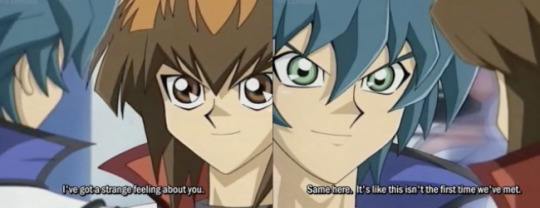
Judai and Johan from their first meeting, get the vague sense they've already met before. Since this is Yu-Gi-Oh the immediate assumptio would be they had some kind of relationship in a past life, but plot twist it's Yubel.
However, I think this red herring is still important because despite the constant comparisons Johan is more similar to Yubel, then they are to Judai.
Edo refers to them both as Duel-Bakas, Shou gets jealous that Judai and Johan spend constant time together after meeting, in everyone else's even probably Judai's they're the same but if you look at their actions as audience members they're quite different. The comparison between them shows the many ways in which Judai is lacking.
Johan is basically Judai, but better. Judai is put on a pedestal by all his friends and seen as a classic hot-blooded shonen protagonist. Johan however, is the one who has all the classic traits of a real shonen protagonist, including having a dream to aspire to, and also fighting to protect his friends.
These are the two most important traits established from basically the first episode with Johan.
Strong bonds
A reason to fight
Johan's personality is more complicated than that, but these two traits are the most important because they're things Judai is lacking in.
Judai is someone is defined by his friendless background, and had no friends until his first year of Duel Academy. Which is why it makes perfect sense that while Judai is in love with the idea of having friends, he doesn't quite understand what a healthy friendship looks like. Judai is also someone who lacks a reason for dueling and only cites he does it for fun and his own personal satisfaction.
Arguably Judai is forced into duels with greater stakes in seasons 1 and 2, but the key word there is forced. Judai is always pushed into those situations, either because his friends aren't strong enough to duel, or his friends actively expect them to fight their battles in their personal lives for him (cough, cough, Sho). In other words he duels for two reasons, either personal satisfaction, or carrying the burdens of others because that's the way he keeps his friends around him.
Judai is ruthlessly criticized for both of these in season 3, the stakes of dueling become too high and Judai just crumbles under the pressure of having to duel for everyone else. As a result his friendships which were never that stable to begin with fall apart.
Johan on the other hand has a goal on his own, and while he might be a tad overprotective of Judai he's also able to coordinate with the rest of the group. In fact when the whole school is teleported to the other dimmension, it's Johan who steps up to lead, while if you notice Judai's actions he splits off from the group repeatedly. Johan's actions are also the reason they are able to return home, because Judai was unable to do anything substantial to defeat Yubel.
One of Johan's first interactions with Judai is him pointing out how callous Judai can be towards his friend, something which others would usually brush aside.
Sho: Bro… I thought you would have something to say to me. Johan: He seems lost. I think he just wanted you to give him some advice. Judai: Sho will be fine.
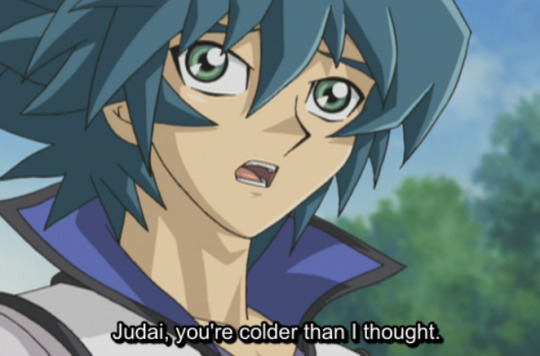
More importantly Joha can notice these flaws about Judai and immediately point them out and confront them about him, while still remaining friends with him on the whole.
Johan is Judai's model for a positive friendship. In comparison the friendships he has with other people crumble because of inability for both sides to communicate.
When Judai and his friends travel together to another dimmesion, Judai is selfish in constantly disregarding others feelings and running ahead, and at points even lying to them and going against plans they all made together. However, Judai's friends are unable to confront him about these issues and instead mostly talk and complain among themselves behind his back. Judai might not have listened in his state of mind, but they don't even make the attempt.
In fact the friends who do try to confront Judai about his behavior are August and Jim, characters Judai has known just about as long as Johan in comparison to friends he's had for two years who don't feel comfortable having a basic confrontation with him.
Judai's friendships suffer from the fact that none of them are truly equal. Sho for example is the first person Judai meets on the island and the one who he's known the longest, but one of their first interactions is Judai expressig discomfort for the fact Sho calls him his older brother because he wants duelist to be equals and Sho just ignoring him and continuing to call him that.
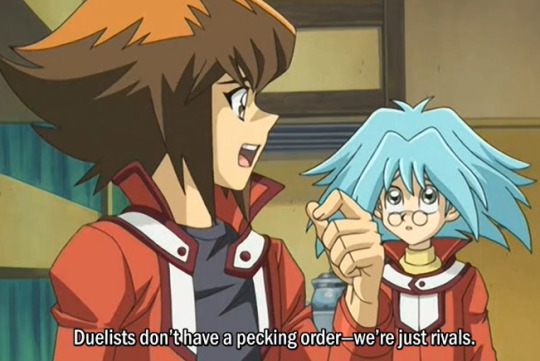
Once again I believe there is problems on both ends, Judai is very selfish and has a tendency to be ignorant of other people's feelings. On the other hand, Judai's friends eventually get in the habit of expecting him to solve their problems because they've built up the idea of him in their minds as the group hero.
As I said the friendship crumbles from both ends in season 3, part of it is Judai being selfish and acting like he's the only person that matters, part of it is his friends ruthlessly criticizing him because he's failing to live up to the image they've constructed for themselves.
Judai's friendships are fundamentally unequal but Judai himself isn't aware of this because he has no idea what a healthy friendship looks like - until he meets Johan.
Johan is a character not introduced to us in season 3, and yet it's very understandable to the audience that Judai would become so obsessed with saving someone he's known for about a month, to the point where he risks the lives of friends he's known for two years. Because that month has given Judai his first taste of what true friendship is like, rather than the idea of friendship he's been chasing.
Johan is Judai's better half in a lot of ways. One example we're introduced to immediately upon his introduction is Johan's role as someone able to see duel spirits, and his strong relationship with his cards. Just as an example, all of Johan's cards regularly talk to him and Johan even refers to them as the closest thing he has to family.
Judai until that point had a spirit partner that doesn't talk, and his heroes and neo-spacians are more like allies. For Judai the Neo-Spacians are allies in his fight against the Light of Destructio, for Johan the Crystal Beasts are his family.
Johan is also far more experienced as someone who can see duel spirits, while Judai is actively repressing the memory of the fact he could see spirits much earlier in life, and of Yubel.
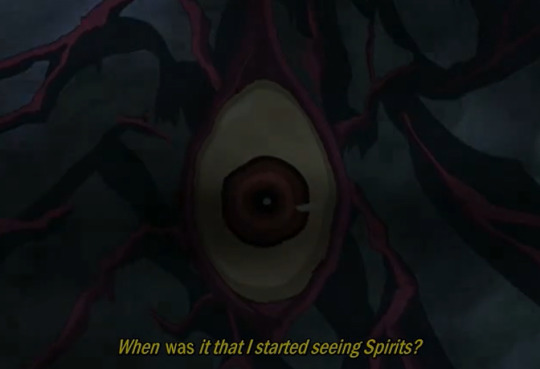
Before the characters even travel to another dimmension, Johans duel against the spirit hunter Giesse demonstrates how Judai is lacking in these two traits, strong bonds, and a reason to fight. It also demonstrates the difference between how Judai and Johan regard their spirit partners, and why Johan's relationship with his cards is better.
Shortly before the duel even begins Judai is pushed to the brink by his previous duel against the teacher. A duel that not only exhausted him, but also deeply disturbed him because the teacher called into question his lack of reason for dueling and Judai had no real response. When Judai questions himself he does something we don't often see him do, he goes to someone else for advice. J
udai basically never lets himself appear insecure or lost around friends who aren't named Johan. Judai even apologizes to Johan for asking something out of the blue, he's so unused to relying on others for emotional support of any kind.
Judai: Johan what have you been dueling for? See, it's about fun for me... Well, for the surprise and happiness too. I guess I do do it for the fun. Sorry, I guess I put you on the spot by asking out of nowhere. Johan: What's this about Judai? Judai: It's nothing. Johan: I suppose there is one goal I have. Johan: Even if someone doesn't have the power to see spirits, they can still form a bond with a spirit. That's why I do it for people like him.
Johan wants to be a bridge between humans and spirits. Not only is Johan a character defined by the strong bonds of friendship he forms, but his life's goal is also built around improving the bond between spirits ad humans.
Immediately afterwards, Judai gets up and struggles to duel against their next foe. However, this time Johan steps up to duel in Judai's place, which is also a drastic change from Judai's other friends. Unless they had a strong personal bond like Fubuki and Sho with Ryo, Judai has stepped up to handle all the major duels since Season 2. Judai even experiences anxiety over letting Johan go and duel in his place.
Johan is introduced to Giess the hunter, a spirit hunter who actively found a way to kill spirits. A character like that seems like Johan's obvious narrative foil. Giess even invites the comparison between the two of them, saying that Johan is obsession with getting his hands on Rainbow Dragon is similar to how he hunts spirits.
However, Giess works much better as a negative foil, or shadow of Judai. Which is why it makes sense Johan is the one who duels him, because he represents the best in Judai while Giess represents the worst.
Now the question is how could Giess possibly be compared to Judai? Yes, as I demonstrated above Judai is much more inexperienced with seeing spirits than Johan is but he's never actively malicious towards them the way Giess is.
Except, you know when he slaughters hundreds of duel spirits after turning into Haou the Supreme King.
Giesse has a final monologue upon his defeat, to explain why he does what he does and his cruelty towards spirits. Giesse who has probably been able to see spirits as long as Johan once formed a strong bond with a duel spirit, but he was separated from that spirit. The pain made him close his heart off to forming bonds with any other spirits.
After losing his duel spirit partner he came to conclude it was impossible for humans and duel spirits to get along, because the spirits are too pure hearted to understand humans.
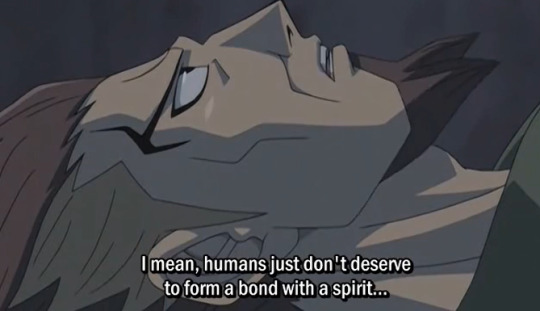
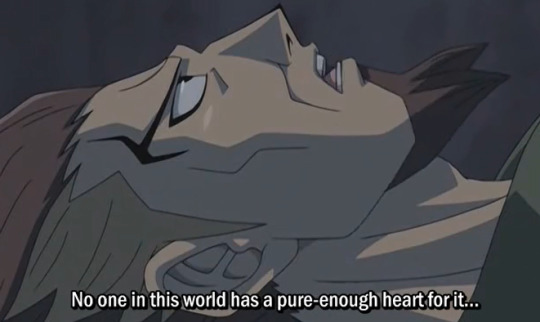
Giesse foreshadows Judai's downfall and his actions as the supreme king. Giesse's start of darkness was being forcibly separated from his spirit partner. The entire conflict from Season 3 happens because Judai made the choice to send his childhood friend / spirit partner Yubel into space.
Ironically, despite Yubel beig corrupted by a force called the Light of Destruction, and having a very twisted, sadomasochistic view of love I think Giesse's words here describe why Judai and Yubel can't understand each other.
Yubel is in a way too pure hearted.
We're never given a reason why Yubel became so overprotective of Judai in childhood before they ever became corrupted by the Light of Destruction but we know one thing for sure.
Yubel has no understanding what they did was wrong. They saw themselves as doing their job of protecting Judai which they sacrificed their body for in the past life. They neither understand why Judai was upset by their actions, or why Judai was upset when people started avoiding him because for Yubel being alone with Judai was enough for them.
It makes sense that Yubel wouldn't understand that Judai wants to have friendships with other children his own age. After all Yubel is a spirit that can only be seen by Judai. For Yubel, there is only Judai, they can't communicate with others, they can't form other friendships. Which is extra tragic if you remember that Yubel wasn't born a duel spirit but a personhood, and gave up their very personhood for Judai.
Yubel is very pure-hearted in a way that's almost insidious, they are so straightforward about their love for Judai, and they exist solely for Judai's sake that they can't understand why Judai has room for other people in his life, because there's no one else for Yubel.
The conflict in season 3 comes from Judai's decision to abandon Yubel. Judai can't come to an understanding with Yubel because Yubel is too pure, being a duel spirit that only exists for Judai's sake.
Judai also follows a similiar path to Giesse, when he loses Johan along with the rest of his friends Judai makes the decision to give up on the notion of love in order to gain power instead.
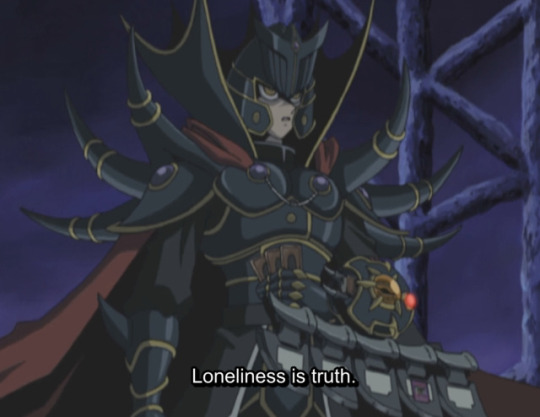
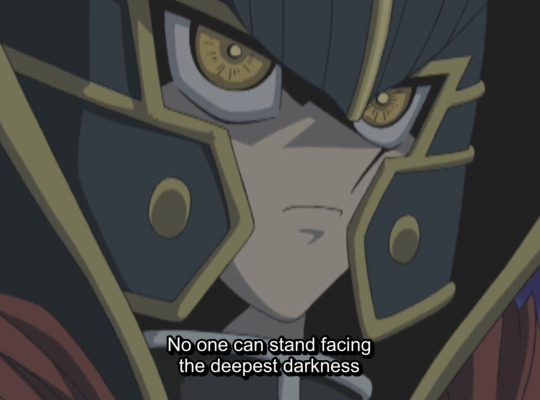
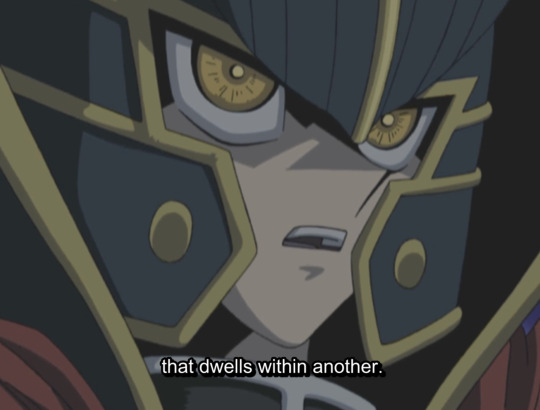
This is quickly followed by him killing duel spirits en masse, probably more than Giesse managed to kill in order to sacrifice them to forge a powerful card. When Johan is battling with Giesse he's literally battling a reflection of the worst part of Judai. Which sets up Johan's role in the series to guide him to his best self.
In summary Johan's relationships with his spirits are strong and healthy, Judai's relationships with Yubel is weak and unhealthy. In fact, Judai is helping achieve his dream of being the bridge between humans and spirits by essentially teaching Judai what strong bonds looks like.
Johan is also symbolically Judai's complementary half in a lot of ways. Each of the new transfer students plays a deck that embodies one elemental step of the stage of alchemy, August is fire / Nigredo, Amon is Water / Albedo, and James Crocodile Crook is Earth / Citrinitas. Johan is the only exception to this rule, because he plays the crystal beasts which are modeled after the seven colors of the rainbow.
Johan is light which puts him into the contrast with Judai who's both set up as the chosen one of the "gentle darkess" to fight the light of destruction, while at the same time someone corrupted by that very darkness into becoming Haou.
Which sets up Johan to contrast to be a pair with Judai. My friend Kaula or @nini-the-mirror pointed out to me we're shown two types of darkness, the destructive darkness embodied by nightshroud and the gentle darkness. While the light of destruction is set up as a destructive force in the universe, there's also Johan's light based crytal beasts, and rainbow dragon which cleanses away darkness. Fusing Rainbow Dragon with Neos purged Yubel from Johan's body, and when Judai was trapped in darkness illusion in Domino City and believed Johan to be Mr. T, it's Johan and the Crystal Beasts who purify him once again.
Johan's desire to be a bridge between spirits and humans, his northern heritage, and Rainbow Dragon all call to mind the Bifrost, a rainbow bridge which connected heaven ad earth.
The bifrost was a connection between the mortal world, and the realm of the gods, or the physical and the spiritual. Just as Johan is a mortal who can talk to spirits. Yu-Gi-Oh GX is also an anime heavily based off of alchemy concepts, and one of the central ones that's even said by Professor Daitokuji himself is: That which is above is like to that which is below, and that which is below is like to that which is above.
It's a phrase written on the Emerald Tablet, often shortened to "As above, so below." It means the mortal world effects the world of the cosmos, and the world of the cosmos effects the mortal world because everything is connected.
By wanting to stregthen the bonds between humans to spirits Johan is basically embodying this phrase. Judai's goal as the alchemist is to be the one to make changes in the mortal world that affect the cosmos. For example, his battles on earth against Saiou has a direct effect on stopping the Light of Destruction, but honestly again Johan serves his role a lot better than Judai.
Johan is in fact a character written around the concepts of bonds itself, the bonds of humans, the bonds between friends. Judai cares about these things too, he wants to be a good friend, but he has lots of flaws that stunts his growth and holds him back. His inability to integrate his shadow also presents him from being his best self (the golden shadow).
To quote my friend Psyche:
"The shadow is basically the storehouse of everything you don’t like about yourself. The things that others are but you could never allow yourself to be. But it’s also the storehouse of the alchemical gold."
Not only is Johan the best parts of Judai by being his golden shadow, he's also essentially Judai's goal. Judai wants to be like Johan.
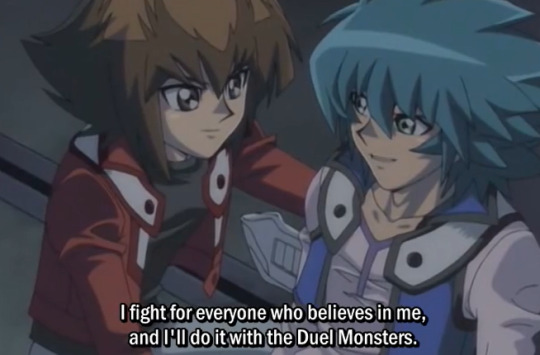
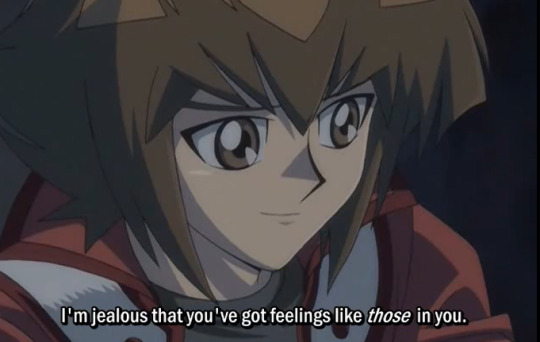
If Johan gives Judai these things he's lacking, a healthy friendship, and a reason for fighting, then problem solved right? All Judai needs to do is marry Johan.
If you can't tell I was being sarcastic.
The Prismatic Phase
Alchemy is a process of refinement, of breaking down and forging into something stronger. However, when the metal starts out it's full of impurities that need to be hammered out. Alchemy is often used as a metaphor for both character growth and developing relationships in stories, after all if a character starts out perfect there's no story.
I said above multiple times Johan exists to demonstrate to Judai what a healthy friendship is to Judai. However, the attachment that Judai forms with Johan is anything but. Albeit for different reasons than the rest of his friends.
Johan is indeed someone who is set up as Judai's equal, and also strives to be his support rather than constantly relying on him for battles. Johan doesn't just exist to be a good friend to Judai however, he also demonstrates leadership skills Judai doesn't have when faced with a school full of hungry students teleported to another dimensions.
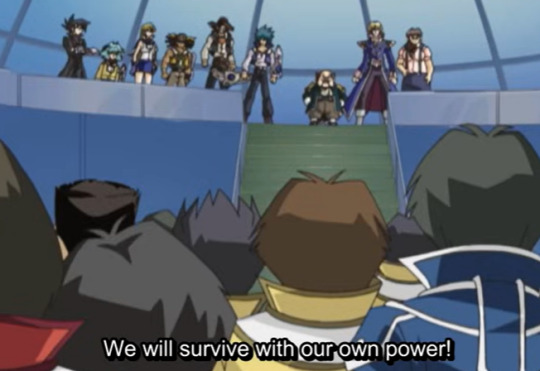
The problem is on Judai's end. Judai definitely needed a friend like Johan, because he's never experienced a friendship between equals before. However Judai as inexperienced as friendship as he is takes this openly supportive friend and starts using him as a crutch.
There's one scene in particular that demonstrates this problem. In the leadup to the cobra duel, Judai confided in Johan twice that he doesn't have any real reason for dueling and he's insecure about that fact. Cobra then criticizes Judai heavily once again for his irresponsible attitude.
Seeing Judai about to crack under the pressure, Johan takes the moment to encourage Judai by reminding him that he has in fact been carrying everyone's responsibilities on his shoulders all along.
Johan: "Why are you so scared Judai? You think there's nothing riding on you? Quit messing around. You've always had everyone's hopes on you. Anyone who's being counted on'll have people putting all their hopes on him. Isn't that what you're always burdened with. What will happen to us all if you lose?"
Well-meaning advice from Johan, but wrong for Judai for two reasons. The first is that Judai's reasons for fighting are something he has to think through for himself. That's how character development happens. Judai can't solve this inner conflict by having Johan just show up and drop the answer in his lap. He still hasn't thought about what he wants to be, he's just accepted Johan's words at face value.
The second is that Judai taking on other people's burdens is precisely the problem. Johan is such a self-reliant person he can give his support to other people without tiring himself out, but Judai can't. Johan wants to protect his friends. Judai duels for his friends because he's absolutely terrified of losing his friends, that's the difference.
Judai's not mature enough to handle other people's burdens and eventually the pressure gets to him and he completely cracks. Judai's just not mature enough to have a healthy relationship with Johan in general.
A relationship where being separated causes one person to have a complete emotional breakdown is not a healthy relationship.
In fact Judai completely ignoring all of his friends after a separating from Judai, and wanting to get him back ad being willing to sacrifice anything for that goal is a parallel to Yubel. Yubel is also someone who was separated from their best friend who they emotionally depended on, and stopped caring about anything but said friend, and was willing to sacrifice everything to reunite with them.
You could liken the disappearance of Johan, and the subsequent rising of Judai as the Supreme King as propelling him through the black phase of alchemy Nigredo, where the soul is brought to its lowest point and the worst flaws are revealed.
In the second sense, "the nigredo of the process of individuation on the other hand is a subjectively experienced process brought about by the subject's painful, growing awareness of his shadow aspects. It could be described as a moment of maximum despair, that is a prerequisite to personal development Here is "the darkest time, the time of despair, disillusionment, envious attacks...Nigredo, the blackening" [Source]
Johan's friendship is important to Judai, but his union with Johan doesn't actually fix any of Judai's problems and aggravates them in some ways. Judai doesn't even start improving as a character until after they seperate.
Johan isn't the rubedo the end result of alchemy, he's the pristmatic phase, the shining light of inspiration.
One metaphor I like to use for the Prismatic phase is the Star in the fool's journey. GX references Tarot and the fool's journey too, and like alchemy it's also a metaphor for personal growth. The fool (Judai) a person brimming with infinite potential, yet one who is also supremely ignorant, walking forward blind has to wise up to the wys of the world.
In the Fool's Journey the Star is a period of brief respite after the disaster of the tower. A beacon of hope and inspiration appears before him.
The Fool is suffused with a serene calm. The beautiful images on the Star (17) attest to this tranquility.Radiant stars shine in a cloudless sky serving as a beacon of hope and inspiration. The Fool is blessed with a trust that completely replaces the negative energies of the Devil. His faith in himself and the future is restored.
Doesn't this just describe Judai and Johan's first meeting to a T? Johan is supposed to be Judai's guiding light in the story ater all. However, the Star is immediately proceeded by the moon the card of illusions and self doubt.
Just like Judai becomes too reliant on Johan to provide him all the answers, the light of the star makes the fool vulnerable to the illusions of the moon.
What effect could spoil this perfect calm? Is there another challenge for the Fool? In fact, it is his bliss that makes him vulnerable to the illusions of the Moon (18). The Fool's joy is a feeling state. His positive emotions are not yet subject to mental clarity. In his dreamy condition, the Fool is susceptible to fantasy, distortion and a false picture of the truth.
Season 4 even invokes star and moon symbolism in regards to Judai and Johan in a negative light. Fujiwara looking into Johan's heart says that Johan's weakness is Judai himself.
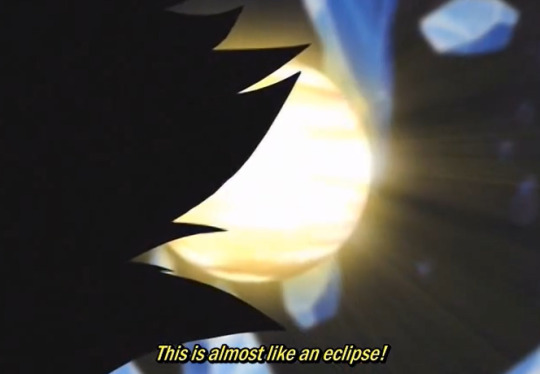
He describes Johan's friendship and fixation on Judai as a moon eclipsing the sun. That's not two opposites balancing each other out that's one obscuring the other.
The season 3 version of their relationship is unhealthy and therefore needs to be broken apart and reformed. That's the process of alchemy, even if Yubel didn't kidnap Johan they probably would have broken apart some other way because Judai was too dependent on Johan.
It's also a violent process that includes Judai needing to duel Johan in a way where they are both inflicting pain on each other in order to purify Johan of Yubel's control. Yubel and Fujiwara both comment that underneath it all Johan desires a violent conflict with Judai. Which is probably something that would be explored more if Season 4 was longer. My interpretation however is that Johan being who he is, is kind of forced into the role of caretaker when Judai is involved as Judai is often in need of taking care of. That probably produces darker feelings for a change in their relationship.
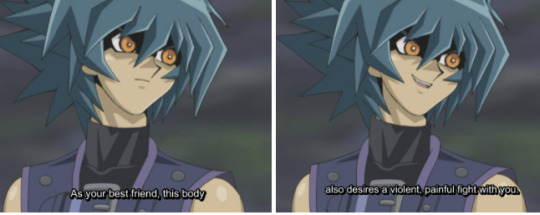
The opposite of unions is a violent process that requires dissolving your previous self. The dictionary of Alchemical Imagery defines it as-
one of the central images of the opus alchymicum and a crucial operation in the creation of the philosopher’s stone. The alchemists were ultimately concerned with the union of substances, the reconciliation of opposites. Through the ‘marriage’ of opposites the goal of the opus, the production of gold and its metaphysical equivalent was obtained. (p. 35)
Judai doesn't marry Johan, but they do have their friendship broken apart and reforged again and it's representative of the prismatic stage.
The Peacock's tail which Johan represents is also like the Star in tarot, a stage where a guiding light suddenly appears. One of the Spector Solis plates , Plate 16 - which depictins a Peacock in a flask is a good representation of this stage.
It is a plate of what else but unity.
The unity that began in plate fifteen is fully realized with the encapsulated animal’s transformation into a single-headed being. The peacock tail is a physical stage in alchemy, a brilliant flash of green which comes to signify that the alchemist is one the right path. It can also be recognized in spiritual/psychological alchemy as a flash of visions that come to the adept as they move through the phases of transformation.
The peacock doesn't just appear to guide the young alchemist through the phases of alchemy however, he also guides them spiritually.
Plate sixteen embodies that process, the turning point where the adept reaches a new level of consciousness with a flash of the peacock’s tail. Consider the words spirit (i.e., the wine), spiritual, and inspiration. To inspire can mean to breath; it can also mean to transmit fervor. Spirit can be meditative, or evocative.
Who better to provide spiritual guidance to Judai then the person who's goal in life is to become the bridge between humans and spirits.
As the star's dazzling moment of inspiration is just temporary, the plate also emphasizes that the peacock's tail itself isn't the ed of the journey. One of the most significant symbols on the painting is the appearance of three people drinking wine and eating grapes. Three people = three stages of alchemy. As for the rest.
The key to the process of plate sixteen lies in the bottom left-hand corner, with the three people seated at a table, drinking wine and eating grapes. The process of this plate is fermentation. Grapes must be crushed and destroyed to create sweet intoxicating wine. The grapes are perfect as they are, but by destroying them we can make something higher, something that can alter consciousness.
Judai has a nice, comfortable, supportive friedship with Johan but he's the one receiving most of the support. By destroying that relationship, he's able to make a healthier one. Ironically it's the separation from Johan that teaches Judai how to exist apart from him.
In that sense Judai's character development revolves around two figures in season 3, two important relationships, Judai needs toto reunite with Yubel, and he needs to separate from Johan after quickly becoming too codependent.
The three of them together even form an alchemical trio. Often works featuring alchemy symbolism will divide characters into three different roles, the soul (anima), the spirit (spiritus) and the body (corpus). Symbolic of three parts of one whole person. The main characters of a work are often symbolically marked as one of the three.
The classic symbolism of alchemy is the circle, the triangle representing soul spirit and body, the square that repreents the four elements, the small circle, and the man and woman which form the rebis.
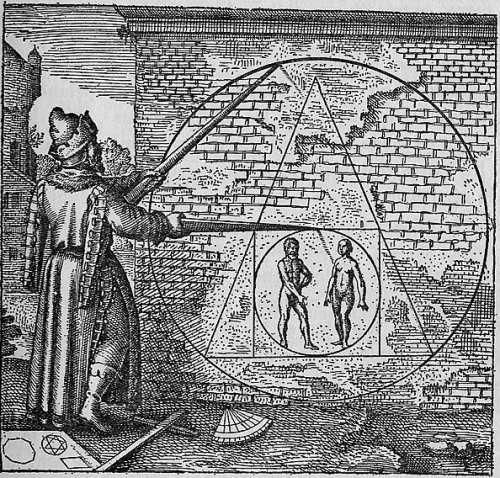
The triangle is what we're talking about here, in terms of marking characters to Soul, Spirit and Body. Though, another variation is Mind, Heart, and Body.
Most commonly, authors mark their male protagonist, the Male Principle of the Work, as heart and their female protagonist, the Female Principle of the Work, as mind. If they have a companion, he or it will be marked as Body. If you look back at the Mundus Elementaris that I just posted you’ll see that Sun corresponds to Cor (heart) and Moon to Cerebrum (brain). The characteristics of a “heart” character are pretty much what you’d expect: courage, self-sacrifice, occasional rashness and impulsivity. The characteristics of a “mind” character are if anything even more obvious. “Mind” characters are knowledgeable, book-smart, and sometimes overly cautious. What about the Body character? There isn’t one in every alchemy story, but when this does appear, the markers are predictable. Body characters are focused on their bodily needs–they are hungry, thirsty, and, in adult stories, lusty. And they are often fearful. [SOURCE]
In this case in a slight difference from the norm, I'd argue that Judai is the heart, Yubel is the mind, and rather than body Johan represents spirit.
The three of them essentially make up the trio of Judai's two most important relationships. Judai is a part of other groups, because GX has a ensemble cast. In seasons 1 and 2 he mainly hangs out in a trio of Sho, Hayato and him, and in season 2 it's Sho, Kenzan and him. Season 4 kinds of marks Judai, Asuka, Sho and Manjoume as the most important students of the graduating class.
However, the characters that influence Judai the most are Yubel and Johan. Johan is the spiritual ispiration, while Yubel is first a challenge for Judai to wise up and grow up, and eventually settles down into a role of advisor like Astral or Yami Yugi.
The main character trio of Season 3 onward are essentially Judai, Johan and Yubel, and each are critical to each other's growth. All three also participate in the final duel against season 3's villain. Judai and Johan tag team darkness possessed Fujiwara, and Judai and Yubel fight nightshroud.
However, as I mentioned above the way these relationships develop Judai are opposites, one of them needs to unite, the other needs to split.
A lot of people draw parallels to Yubel and Ai, the ally turned final villain of Vrains. Ai is also motivated by love and a desire to protect Yusaku the main character and object of their affections. However, the greatest point of comparison is that the option of fusing themselves together, an obvious call back to super polymerization is brought up by Ai in order to be flatly turned down by Yusaku.
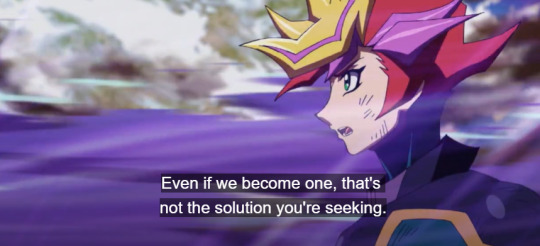
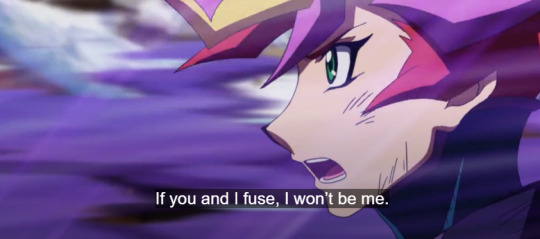
And you won't be you.
The parallel to Judai and Johan is not as obvious here, but think about it Judai is his absolute worst self when he's willing to sacrifice anything just for the chance of having Johan back
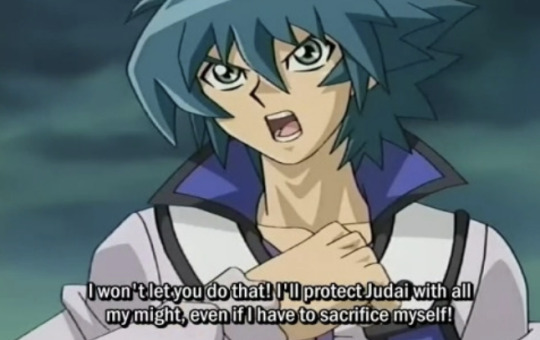
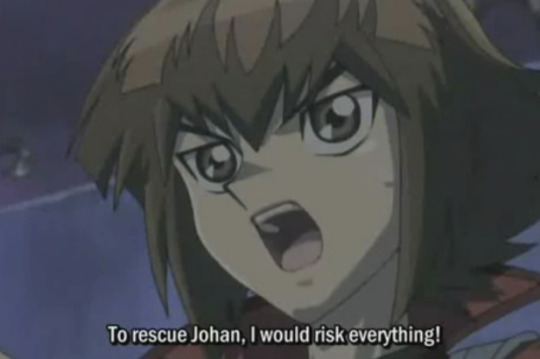
Okay but just look at how different the two are. Both Johan and Judai, when put in very similar situations (having to save someone), tell us what they’re willing to risk for that goal. They’re both very clear about that. Johan is willing to risk himself. Judai is willing to risk everything else. [Source]
Judai become so destructive in his path to get Johan back, including slaughterig duel spirits en masse, somethig the self appointed protect of duel spirits Johan would absolutely hate that you have to wonder if his desire to have Johan back is even about Johan.
Judai doesn't have much respect for Johan's agency as an individual. It's normal for Judai to be sad, or even to have survivor's guilt when he thinks Johan is dead because he sacrificed his life to save him.
However, Johan didn't sacrifice his life to save just Judai but everyone else. Johan also made the choice to sacrifice himself so Judai would be safe. Judai's response to that choice is to immediately throw not only himself but his friends into repeated danger in order to rescue Johan, and then when all hope is lost start hurting spirits.
Judai doesn't respect fact that Johan wouldn't be happy with Judai hurtig himself or others, especially spirits, because rescuing Johan was never about Johan, but Judai's own feelings of grief.
Juudai is a deeply flawed protagonist. He’s more selfish than any other protagonist this franchise has ever known. The way he goes after both after Johan in season three and O’Brien shows that he actually doesn’t care all that much for them as people. To him, they represent a concept: Victory, or at the very least atonement for his past actions. A convenient way to right what he did wrong. That is not to say that he doesn’t like them as people - he does. But when the chips are down, what he ultimately wanted was a chance to redeem himself by saving them. [Source]
Yubel and Judai are opposites who need to be united and learn to live with each other. The crux of Judai and Johan's problem is that really they're so similiar that everyone, including Judai sort of sees them as the same perso. However, as stated above just underneath the surface they have a lot of differences that could lead them to an unhealthy relationship. Judai just like Ai needs to learn that Johan is a separate person from him.
Which is why Judai's greatest two character development moments with Johan come not from the moment where he fuses rainbow dragon with Neos for the first time to cleanse Judai's body from Yubel.
It's actually immediately afterwards, when Johan hands Judai his deck to face Yubel. While Judai also makes the decision to face Yubel alone.
The arc theoretically could have ended right there. Judai's objective was to save Johan, and Johan was saved. Except the real conflict of the arc was that Judai needed to learn to take responsibility for himself, instead of leaning on a convenient crutch like Johan.
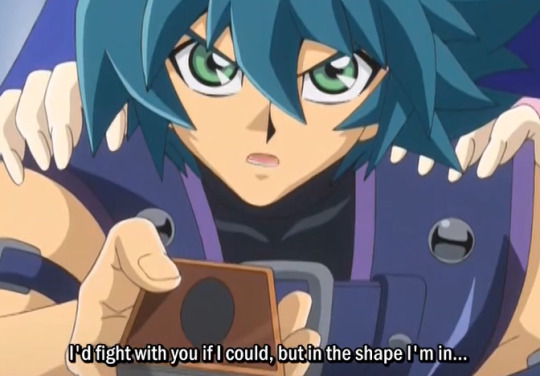
In Yu-Gi-Oh a duelists deck is often referred to as their soul, so Johan is entrusting Judai with a lot. That simple action really shows Judai that Johan can support him even from a distance and the two don't need to be attached at the hip.
In the tag duel against Fujiwara, Johan makes a similiar decision of sacrificing himself in order to protect Judai. However, to show how much he's changed since season 3, this time Judai does't completely lose his mind over Johan's sacrifice and respects Johan's feelings instead. Johan doesn't want Judai to fall apart, he wants Judai to carry his feelings with him and finish the duel for both of them and that's what he does. Judai has learned now to accept support without completely turning Johan into a crutch.
Citriniatis is also the third stage of alchemy. Each Season of the four seasos Yu-Gi-Oh Gx represents one of the four stages of alchemy.
The third stage is often referred to as the stage where the light which appears in albedo starts to shine.
Seperation from Johan essentially kicked off Judai's blackening stage, waking up his shadow in the form of the supreme king and bringing light to his flaws. This passage in particular describes it as a "rising sun" and "bringing light to consciousness."
In most cases Jung himself expressed the work as having three stages. Still, citrinitas seems to fit better into a flow of growth and development, as well as mystical progress as the third stage. In the second stage, albedo, a light appears in the nigredo darkness, the light of an awakened soul which is symbolised as a moon (the feminine) shining in the darkness. The third stage, citrinitas, brings forth the light of the sun (the masculine), a light which magically transforms the shadowy and fearful subconscious into valuable consciousness. From the dark night of rubedo, to the pale morning light of albedo, the sun rises in citrinitas to the culmination of day in rubedo. [Source]
Johan is simulatenously a light which shines on Judai's worst flaws just by being his better self and showing how selfish Judai is in comparison, while at the same time he's also the light that guides Judai on the path of healing.
After all Judai's final action in Season 3 isn't to kill Yubel like the Supreme King, or like a hero would, but rather to reconcile with Yubel. That's a path Johan would have taken considering Johan's whole goal is to help lost spirits like Yubel repair their relationships with humans.
Judai's journey of atonement even takes a similiar path to Johan, and mirrors Johan's dream of becoming the bridge between humans ad spirits. Unlike the duel between Cobra and Judai though, I don't think in this case it's Judai relying on Johan to give him the answers in life.
This is because the two of them have entirely different reasons for wanting to help spirits. Johan wants to help spirits because the strong connections he feels with spirits, and the crystal beasts in particular give him the only sense of family he's ever known. It's also because of an encounter with a little boy who lost his Jerry Beans Man where he came to understand that even people who can't see card spirits still feel a strog bond with them.
Judai however has an entirely different motivation, his journey to help duels spirits is a journey of atonement. It's also one he's taking together with Yubel because they both have a lot to make up for and a lot of healing to do.
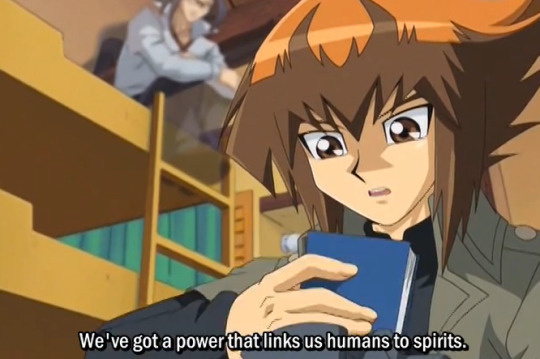
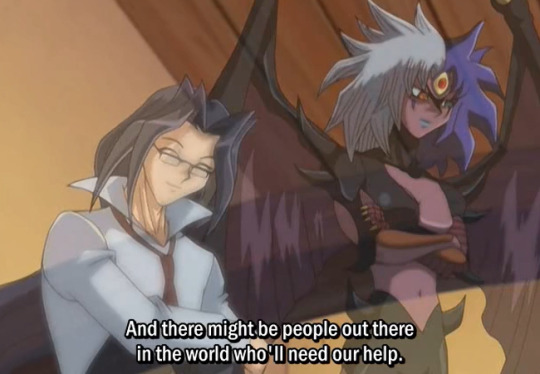
Judai also didn't start out Season 4 wantig to become the bridge between humans and spirits. In fact he spent most of season 4 sitting alone in his dorm being depressed and aimless. It's his confrontation with Fujiwara, and his act of helping Honest reunite with his spirit partner Fujiwara that gave Judai the idea that he could help heal other spirits too.
Following the motto of dissolve et coagula, dissolve and coagulate all the troubles and tribulations and even the separation of Season 3 was necessary for the much healthier bond between them in Season 4.
Judai doesn't even say goodbye to Johan at the end of the season, and he leaves without telling Johan where he's going, but essentially they are still walking the same path of uniting spirits and humans and it's a path Judai would have never found without Johan's help.
#ygo meta#johan andersen#judai yuki#yubel#yu gi oh gx#yu-gi-oh gx#yu gi oh analysis#spiritshipping#alchemy
82 notes
·
View notes
Note
What red flags do you think Adrien has?
First and foremost, Adrien hasn't changed during the series. Like, at all. If this had been any other series with a "Status Quo is God" mentality, I wouldn't be so nitpicky. The problem is we were promised plot all the way back in Season 2. And plot typically involves characters changing, growing, and developing along the way. I know I'm gonna sound like a broken record, but Avatar: The Last Airbender is pretty much the gold standard of what kid's shows nowadays should aspire to be like. The old "it's for kids" excuse is only gonna go so far when we've had gems such as ATLA, the Batman Animated Series, the OG Justice League, the OG Teen Titans, heck even anime like Sailor Moon and Dragon Ball Z on air. I'm personally not a fan of Dragon Ball Z, but even I can acknowledge what Akira Toriyama accomplished.
Those works also weren't afraid to get dark and scary while still being age-appropriate. Something modern kid's cartoons can all learn from, be it Disney, Cartoon Network, or even Nickelodeon. And something they all have in common? A strong and well-structured plot. Emphasis on "well-structured". I can't claim to know what goes on in the writing room of Miraculous Ladybug, but it's painfully clear hardly anyone knows what they're doing. And it's resulted in the "plot" of the show turning into a tangled tumbleweed drifting across the desert of discarded but better-written ideas.
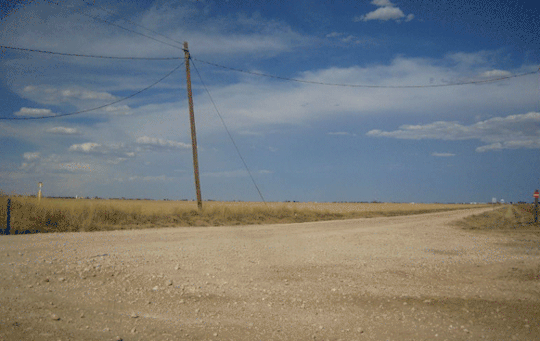
Whatever the metaphor is, anyway.
Let's continue.
Adrien's second biggest red flag is his continuous defense of characters like Chloe and more recently Lila. I'm admittedly ignoring Season 4 onward because I cannot fathom disrespecting your characters (and audience) so much you turn a kid's show into your own vanity project just to stroke your ego. But that's beside the point.
Adrien has the unfortunate habit of defending problematic people like pre-"redemption" Chloe (I use that word loosely as I'm doing my own Chloe redemption in my fic with Rafe) and Lila. You could argue that it's because of the way his father raised him. But it defeats the whole purpose of Adrien getting to go to school.
School is a place where you learn and grow. And figure out how to deal with unpleasant stuff, such as bullying, incompetent teachers, and apathetic faculty (I'm telling on myself, I just know). The problem is that Adrien, despite all his chances to figure out how to unlearn the behaviors Gabriel instilled in him, has not once made any active attempts to improve himself. Yeah. I know. I may be a little too harsh on him, but that's because I saw potential in Adrien to be much better than he is now. Disregarding the Sentimonster theory being confirmed (again, I'm also ignoring that), Adrien's stagnation is very telling of both the character and the writers. No matter what happens in the show, the universe bends itself backwards to acknowledge his existence. Do you know what that's called in writing?
A Mary Sue. Or, in Adrien's case, a Marty Stu. You could argue that Marinette is a Mary Sue, but she gets torn down so much in the show the argument is pretty much moot.
Do note that this is not aimed to tear down anyone who's written Mary Sues or Marty Stus. I've created several of my own in my early days as a writer. Who hasn't. The thing is, though, as I grew up, so did my characters and my writing.
Adrien hasn't grown up since the start of the show. And that's very telling.
Then there's the third biggest red flag of Adrien: his behavior as Chat Noir. I know it feels unfair to use that against him, but it's been stated multiple times that Chat Noir is, in essence, Adrien's true self without his everyday mask.
If that is who he is without any limits, then I want him as far away from me as possible.
Preferably, with a restraining order.
I have yet to figure out why this keeps happening when Hollywood and other big-name studios write romance — even by female authors and writers — but it has to stop. Men, most sane women prefer it if you accept the first "no" as an answer. That goes for you too, ladies. No, I don't care if this pisses anyone off. I'm an equal-opportunity realist. And I'm gonna say something that will likely have people calling for my head on a pike:
Relationships in general are built on mutual trust and communication. It's hard work maintaining a healthy relationship, it really is. But more often than not, it's one of the most fulfilling things anyone can possibly dream of. No, this doesn't mean everyone is obligated to say yes to romance. There are those who choose to avoid romance altogether.
And that's perfectly fine. I just happen to be a romantic who enjoys romance. That's my personal preference (no, this doesn't mean I like red flags).
The writers of Miraculous Ladybug seem to be under the impression that teenagers should hook up with the first hot person they meet. And that's a very dangerous message to spread. Because what if the first hot person they meet is a domestic abuser? Or worse: a criminal who has no issue using whatever they can to control and dominate their partner.
Adrien — and by proxy, Chat Noir — has displayed behavior that's alarmingly similar to domestic abusers despite his sunshine persona. He's destroyed property because Ladybug told him "no" (Sentibubbler). He set up a date even though Ladybug told him she had plans, then had the audacity to get huffy and upset about it (Glaciator). He's lied to someone about his relationship with her, then blamed her for the resulting akuma.
Note that the last example was from Copycat, a Season 1 episode. Which bears the disturbing implication that this is an ongoing issue, not a one-time problem.
Adrien Agreste had potential to be a great character.
It's too bad the writers have stressed he's too perfect to change.
19 notes
·
View notes
Text
In a key scene in Red Dragon, an FBI agent tells a group of police officers that there is no doubt that the family serial killer will strike again. “Why?” one woman asks him. “Because it makes him God,” intones the agent. Just days after Red Dragon opened, the police found the Death card from a Tarot deck near the scene of one of the shootings. Inscribed on the card was a message from the shooter. It was reported in the media as reading: “Dear Policeman, I am God.”
Such grandiose allusions to divinity have long been a crucial part of the serial killer myth. They proliferate as well in technological, especially nuclear, mystique and metaphor, most famously when the erudite J. Robert Oppenheimer, “father” of the atomic bomb, named the bomb test site “Trinity” and then, while witnessing the first atomic blast, recited the god Krishna’s words from the sacred Hindu text, the Bhagavad-Gita: “I am become Death, the shatterer of worlds.”
More mundane occasions for such utterances occur regularly in popular playtimes. In the media storm that followed the discovery of the inscribed Tarot card in the Beltway case, the public learned that “I am God” is a common declaration by victorious players of violent video games. We were reminded that Eric Harris, one of the two teenaged boys who committed mass murder at Columbine High School in April 1999, was an avid video game player and had scribbled, “I am God” in another student’s yearbook.
The popularity of this phrase in all of these contexts points to a pervasive, if usually unexamined, recognition that violence, control, total power over others, and specifically masculine lethal violence or the power of “unnatural death,” all have a religious character in our culture. Despite much talk of God being “love” and associated with creation, the phrase “I am God” is not uttered in delivery rooms by mothers, or by those getting the news that they have received the Nobel Peace Prize. The dominant notion of god in the Abrahamic patriarchal religions is an all-male being whose defining characteristics seem to be omnipotence, jealousy, righteousness, judgment, and dominance. This notion of god powers all sorts of terrorism: religious, political, criminal, familial, militarist, nuclear, and any combination of these as power-mad men take up that mythic role, “playing god” by waging war, accumulating fortunes, toying with others’ lives, and lording it over everybody else.
—Jane Caputi, "Goddesses and Monsters: Women, Myth, Power, and Popular Culture."
54 notes
·
View notes
Text
On Alicent hate:
Alicent is the perfect character to show that the same people who call her hypocrite are no different from her: a woman AGAIN is reduced and judged by her role as mother, not by her past experiences, her story, the generational trauma, her lack of safety net, the violence she had to endure all these years, her broken mental state, writing maneuvers to cast her in a bad light by adding scenes/words that weren't there.
And at the same time, having to stay strong when her kids are also breaking down.
People totally dehumanize and deliberately misinterpret Alicent on behalf of Rhaenyra's grief like Rhaenyra's was more valid just because she's girlboss and dragon lady and showrunner's golden girl.
And giving my unasked 2 cents on the matter: no, I simply can't simpathize with Rhaenyra after everything hotd has shown about her. Despite her losses, the artifices used to create the reasons for her pain didn't feel natural for me in comparison to Alicent, THERE I felt real struggle and grief.
While Rhaenyra's pain is healthly expressed (ffs even here she's better than Alicent), Alicent simply CAN'T do it. The same people who felt Helaena's pain, ironically pretend not to see that Alicent's manifestation of grief was a nuance of that same pain.
A worse pain, the type of pain you feel crawling under your skin and still you can't find a way to express it. She was judged for being what society expected of her, and now she's judged again for not being emotional and supportive like a mother should be.
And here's the major point of the post:
It makes me think that vast majority who claim to understand and support women (in this Era where they talk sooo much about mental health huh?) apparently are the first to let their masks fall when criticizing Alicent.
It makes me think how people reduced her to an object of their anger and unresolved feelings offline. It's exhausting to pretend you're good and virtuous all the time, right? It reminds me of 1984, when manipulated masses gathered everyday for the "free hate session".
Alicent is the perfect character to unmask this pseudo-emphathetic society that uses her to vent their hate every sunday, then return to their everyday lives defending women's rights and freedom.
It reminds me of how these people will proudly hide behind the "it's just a TV show" excuse. It reminds me of how these very same people har@ss and wish team green d3ath threats, or worse, root for women to be "converted to TB by force" (aka have their bodies used against their will) the same brutality that Rhaenyra asked Aemond to be "interrogated".
It reminds me of how Team Green, although small, is very unlikely to do this same thing. It reminds me that Team Green is more likely to be empathetic: their leader is broken, fighting in this world with her bare hands without a dragon to shield her or force people to obey her whims. And even if the men around her have dragons, they're equally broken men, they're not better than her. Alicent can't give them what she had never had. While Rhaenyra had a looot of chances to show she's almost a saint (chances taht didn't convince me at all), Alicent on the other hand is portrayed with almost no redeeming quality in comparison. Alicent is a very flawed character, her counterpart not so much.
It reminds me that in a world where dragons (brute force, coercion, mostly considered male traits) are what people want to watch, the showrunner's attempt to portray a "conflict where men used women as puppets therefore women on both sides are victims" went downhill, for what matters now is who will sit on the iron throne. The only woman who seems to matter is a metaphor for male values and power, while the other one is hated for being broken. It reminds me that Alicent's side is the driving force of this show, for in Rhaenyra's side everybody is perfect or with minimal flaws.
Because if there's something people hate is the truth. And Alicent is the character who unmasks these people every week exposing their true nature: their support is most likely to be given to a dragon lady kind of girl, than someone like Alicent.
When support is conditional, it's not true support.
And that's why people hate her.
You may not win the battle in hotd, my Queen, but you, AND YOU ALONE, have done your duty splendidly: you've won the war in real life.

image source: Lyanna Stark
#here I said it#house of the dragon#alicent hightower#anti hotd fandom#rhaenyra targaryen#team green#team black#if you can't tell fiction from reality#don't you dare to use the “it's just a tv show” as excuse for real life impacts of hotd
26 notes
·
View notes
Note
What do you think about Rhaena and Aegon the Uncrowned? I don't think he should have been named heir over Rhaena but also she never seemed resentful of him for it. Based on what Rhaena says later about being the eldest and the first dragonrider of all her siblings, it feels like she recognizes it was/is unfair that she's not named heir over Aegon/Jaehaerys. But also she clearly loved all her siblings a lot and was close to them before Maegor.
I think about them very much 🤡 I do not really agree that Aegon the Uncrowned was named heir over Rhaena in such concrete terms. Rhaena & Aegon were I believe extremely close (she brought him flying on her dragon an act she only otherwise did with her 'favorites') and from childhood expected to rule together. She was older than him, smarter, a dragonrider long before him, generous and protective yes but she certainly held sway over her siblings, as you say. Aenys summarily refused the idea of not marrying his two eldest children. He intended Rhaena to be half of what succeeded him. Between the siblings, she is the one who speaks frankly and authoritatively. It's Aegon the Uncrowned who proves indecisive without her to support him. In their relationship she was the dominant one so with the facts as they are, I can comfortably say that power-sharing between them was intended/expected to be equal.
The situation with Jaehaerys is different in several significant ways. One, I would actually present the idea that Rhaena is the one who crowned Jaehaerys King, when she stole Blackfyre from Maegor (briefly claiming her Kingship!) only to grant it to Jaehaerys. I believe the trauma from losing so much in such a short time (her father, Aegon, Melony Piper, her innocence/trust in others, and the shattering of her relationship with her daughters) combined with enduring Maegor's Court put Rhaena in a (perhaps temporary) state where she could not bear to fight for a throne which had cost her so much - so she charged Jaehaerys to be strong for their family when she could not be, and he accepted that. He fulfilled his promise but Jaehaerys' strength proved to come at Rhaena's expense in ways she had never anticipated. I doubt Rhaena could ever bring herself to hate Jaehaerys however the fact remains that he used Rhaena as the Other by which he legitimized his rule/Targaryen identity.
Rhaena: had multiple husbands, openly defied them, had only daughters, said daughters were claimed by multiple men (Aegon, Maegor & Jaehaerys) = socially understood as a sexually deviant woman
Jaehaerys: monogamous with a submissive yet treasured wife who was all a mother and Queen should be, drafted the Doctrine of Exceptionalism which replicated existing Westerosi racial ideas = socially understood as a sexually coherent man
Rhaena isn't just queer because she shares intimacy with women, which isn't even particularly abnormal a behavior for the time. She's queer because the threat of being labelled as Queer is how power structures enforce the very orthodoxy which Jaehaerys, to whom Rhaena was contrasted, was able to ingratiate himself within such that he became the mainstream ideal of Targaryen King. To have a status quo implies the Other, the Queer. Jaehaerys and Rhaena: two sides of the same coin (to use a metaphor the asoiaf fandom loves, 😂). I do believe Rhaena held some resentment towards Jaehaerys for the use, intentional or not, which he made of her but again I do not believe she ever hated him completely. He was the monster she helped create to counter the truer monster that was Maegor. And yes, it can also be said that Rhaena was the monster Jaehaerys helped create.
#text#rhaena the black bride#rhaena targaryen#jaehaerys targaryen#jaehaerys i targaryen#valyrianscrolls
13 notes
·
View notes
Text
Claudia, Viren & The Very Real Parent-Child Dynamics of The Dragon Prince
Sometimes I wonder if I come across like I try to defend Claudia too much. That's not my intent at all. I just think she deserves more and better critique.
The Point I guess
Personally, I really connect with Claudia's brand of messy, unflattering and even pathetic rage and grief much more than the dignified and mature ways Callum and Ezran handle things (More on that later). Maybe this sounds unflattering but Claudia being also kind of an asshole really speaks to me. Like that's the kind of teenage girl I'm the most familiar with and we don't have enough media that has nuanced takes on this sort of troubled character. Exploring negative or even anti-social traits and impulses in fiction, especially in women, is kind of undervalued in my opinion. Those are part of humanity and therefore part of us and this impulse to completely reject them doesn't benefit anyone really.
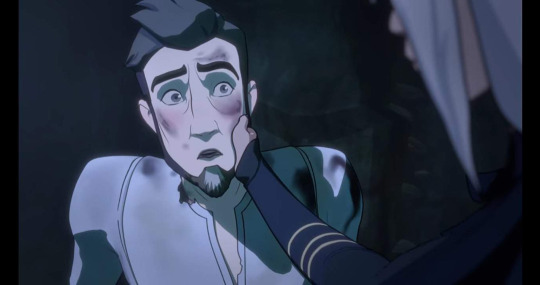
Finally, some wholesome father-daughter relationship rep in media!
My way to view fantasy media is about how it can artistically portray something true to real life. That's why I'm the most invested in this kind of reading of the text. Fantasy media is often dismissed as mere escapism even by the fantasy fans themselves (*side eyes the dude bro Witcher fandom*) which ignores the emotional depths it can reach by approaching difficult subject matter more metaphorically.
Inject Viren & Claudia's Father-Daughter Dynamic Straight into My Veins
There is something viscerally real about Claudia and Viren's relationship. I've seen this kind of father-daughter dynamic play out in real life many times where the child gives and gives and gives yet the parent takes it all for granted until it's too late and the parent-child relationship is just a mangled corpse of its former self, way too damaged to ever be truly repaired.
Like if you've had a difficult relationship with your parents it can feel similar to how s4-5 Claudia struggles to keep Viren alive while Viren hesitates. The child is the one who tries to fix things in the relationship while the parent is in denial or completely oblivious. Viren doesn't really try to connect with Claudia further in s4-5. It almost seems like he's completely emotionally unprepared to have that conversation and oh boy if you know any boomer parents that's pretty damn realistic. He just sort of gives up and acts completely passive because he's so out of touch with his emotions.
There is also this aspect of your parent aging and then one day you realise that you, the child, are the one who has more power in the relationship. It's a universal experience. These are just some of the ways I can see Viren and Claudia's relationship in seasons 4 and 5 metaphorically portray real life parent-child dynamics. There is a lot of emotional truth to how TDP approaches these relationships even when the story itself is an over the top fantasy romp.
How much Viren relies on Claudia is revealed little by little: She got the unicorn horn for the spell that killed Avizandum, she got the dragon horn that helped them cross the lava to Xadia in s3. It's set up really subtly how there is almost this parentification of Claudia like she's the one who took her mother's place as the emotional center and caregiver of the family after Viren and Lissa divorced. It's a lot of pressure to put one a child to say the least. This extends to Soren and how he is treated as the scapegoat of the family when Claudia is the Golden Child. This sort of treatment of Claudia and Soren by Viren is probably the most common analysis of their family dynamic as far as I can tell.
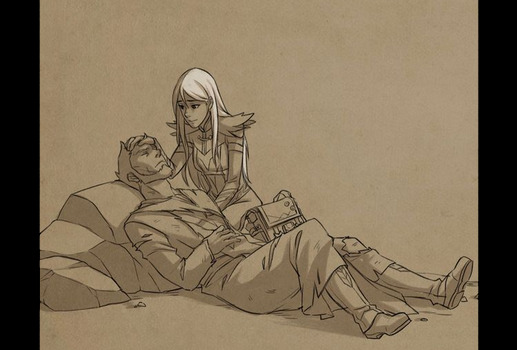
You ever heard of the thing called "eldest daughter syndrome"?
Eventually Claudia's most admirable and positive traits get corrupted (insert here an analysis of the corruptive nature of the dark magic as a plot device). It's like this perversion of feminine nurturing instinct society values and enforces in girls. Claudia's love is not domesticated but something that's so all consuming it destroys everything in its way. In s 4 she insists Viren has to live. She does everything in her power to keep her family together even against the wishes of her loved ones; first it was healing Soren in and then it was bringing Viren back to life in s3. Claudia has fully internalised her role as the caregiver to the point of self-imposed victimhood.
All The Characters Have a Part to Play
Since TDP is meant for an all-age audience (And later for teens and up since they hiked up the age rating) all the younger characters Callum, Ezran, Rayla, Claudia and Soren collectively represent the kind of different and difficult feelings parental abandonment and neglect can cause. A real person most likely feels all of these emotions at some point of their life but in fiction they need to be spread out among different characters or the story wouldn't work as, well, a story.
"she was a mage girl committing warcrimes, he was an elf boy vibing in the woods, can I make it anymore obvious"
I'd gladly read some more critical takes on Claudia's character. There is something very interesting there about Claudia and Terry's relationship for example. Terry is clearly very enamored with Claudia whom he perceives as someone very vulnerable and in need of help. Terry isn't wrong exactly but it does get problematic when he goes to great lengths to protect Claudia to the detriment of his own wellbeing. While TDP itself doesn't draw attention to it there are also the racial and gendered elements, both implicit and explicit, because of Claudia's fantasy racism and because of Terry being a non-white trans boy character as well. Claudia is the most powerful dark mage in Xadia when Terry is just a normal guy. Given the context of the show there is a power imbalance there.
tHÖ END
Why I'm laying this all out is that I think the Internet would be a better place if people didn't try to constantly find an objective "right" way to view a piece of media but instead were somewhat transparent about what they personally got out of it. I think this Viravos meta is the most popular thing I've written so far and I tried to explain my approach in detail because I don't want people to go "look this person says Viravos is canon!". Jokes are fine of course but taking it too objectively ignores the fact that analysing subtext is valuable on its own.
Idk how to end this. Here, have this meme.
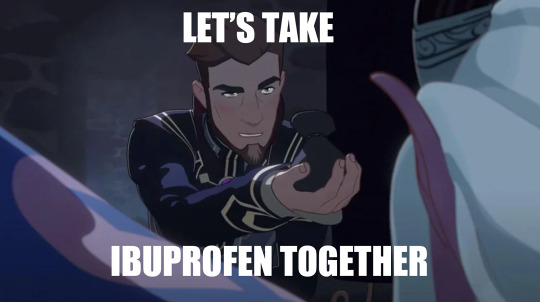
#help! I've gotten stuck in the hermeneutic circle and can't get out!#Viren & Claudia have the most interesting relationship in this show and it just keeps getting better and better#I think this is literally all that I've got to say about Claudia so far#the dragon prince meta#tdp meta#sarasade text
46 notes
·
View notes
Text
Me? Writing an Essay about the themes of captivity, taming and dehumanization related to the Ta’veren boys? More likely than you’d think.
So let’s talk about it!
Perrin probably has the most literal interpretation of this theme as a wolf brother. His storyline is quite literally him grappling between being an animal vs a human. However unlike Rand and Mat most of Perrin’s issues are his own internalized feelings of dehumanization. He treats himself as a potentially dangerous animal that needs to be contained and controlled. A lot of his internal arc is attempting to tame himself and inevitably discovering a balance between the freedom of a wolf and the self control of a human. However inspite of how Perrin himself treats the Wolf aspect of himself, not many people outside of himself actively dehumanize him. With the notable exception of the White Cloaks who treat him like a rabid animal who needs to be put down. Perrin however isn’t disturbed by this because he views himself as a dangerous animal. While others don’t try to tame Perrin, he spends the majority of the series trying to tame himself instead.
Mat on the complete opposite end of the spectrum is almost only dehumanized by others. Mat doesn’t self identify as an animal in any regard nor does he respond with anything but distress and confusion when others treat him like one, only ever identifying as an animal in response to how others make him feel, such as him comparing himself to a rabbit under Tylin’s gaze. Unlike Perrin, Mat however is not viewed as a dangerous animal- with the notable exception of Tuon- but instead as an exotic pet. Something wild and feral that can be domesticated. Tylin is the most notable example of this, going as far as almost exclusively referring to him as various animals. However the Aes Sedai and other women also participate in this, multiple mention Mat needing a good woman to settle him down and domesticate him and the Aes Sedai treat him much the same. Tuon notably begins their relationship thinking similarly about Mat that he’s wild but ultimately harmless only later coming to the realization that his teeth are still sharp- the difference between a house cat and a lion- but this danger only makes her want to tame him more. Tuon very much likes the idea of having a lion on a leash.
Rand meanwhile both dehumanizes himself and also dehumanized by others. Unlike Mat and Perrin, he is neither a wild animal or an exotic pet- instead he and others treat him like a monster. Monsters need to be captured or tamed for others safety not for the status symbol of having it as a pet. While others treat him with a mix of fear and awe, Rand believes that it’s in his nature to cause harm even if unintentionally. Rand treats himself as dangerous but unlike Perrin he rarely tries to tame himself; instead accepting the fact that he’s a monster and all that comes with it. You can’t tame a classical dragon, as they are divine and sometimes even god-like, the best you can hope for is to imprison it which is just what the Aes Sedai attempt to do with Rand.
All three boys experience various forms of captivity, both metaphorical and literal, as well as fear it. Perrin is taken captive by the White Cloaks in book 1 and later after seeing another wolf brother completely feral and locked in a cage begins to fear losing control of himself and being trapped. Mat meanwhile is kidnapped or held prisoner multiple times, by the Aes Sedai, by Tylin and is metaphorically caged by Tuon and the Shadar Logoth dagger. Rand of course has The Box incident but he’s also trapped by his destiny metaphorically and again physically when he’s arrested in Far Madden.
The idea that the three Ta’veren boys are animals meant to caged or tamed is a through line from book 1 that only grows to be more obvious and literal as time goes on. There roles as Ta’veren cause themselves and others to view them as something other than human- and for those in power they begin to view them as less than human- as tools- as animals. Perrin accepts his dehumanization and insists on keeping himself in check, eventually he learns to embrace his wolf side and finds balance so that he can both be free and controlled. Mat fully rejects this dehumanization and despises the idea of being kept in captivity, however as time goes on he begins to resist it less and less until eventually he’s successfully “tamed” by Tuon and finds himself enjoying the security and familiarity that captivity entails. Rand embraces his dehumanization but violently rejects captivity, and at the end of the series he finds himself completely human and finally, blissfully, free.
#wheel of time#mat cauthon#rand al'thor#perrin aybara#the ta’veren boys#wheel of time spoilers#wot meta
43 notes
·
View notes
Note
do u have any recs for folks newer to the yuri genre? I've never really read any manga other than shounen and some magical girl stuff
Omg i can totally give yuri recs. (And which ones to stay away from. Sakura Kiss has cousin shit in it, Citrus has stepsister dubcon, Dragon Maid has lolicon, Happy Sugar Life is also lolicon but it’s edgy about it and tries to act like this makes it deep, we can do better)
Anyway here’s my actual recs! I'm going to give details but if you don't wanna read them I bolded all the titles.
YuriKuma Arashi (By Ikuhara of Revolutionary Girl Utena fame), is about lesbian bears. But it’s actually a metaphor for the simultaneous objectification and demonization of lesbians, the expectation both for purity and predation. There are some nitpicks I have with it like the sexualization being a bit too much to bring the point home, but overall I do like its themes and its message. And I think the ending pulls everything together really nicely. There is both a manga and an anime, and I believe the anime came first. I’ve only seen the anime so I’m not sure if/how the manga deviates!!!!
Bloom Into You is an absolute must. Like, for real, I think it’s one of the best romances out there, yuri or otherwise. It gets really deep into both characters' respective psyches and the ways that they’re both Very Screwed Up when it comes to love and romance, or really just life in general. Giving details would be doing them a disservice honestly. Both characters are very messy but also do try their best to genuinely communicate, and what comes of that is a lot of teenage lesbian drama, but the growth they both experience though it TOGETHER is just great, and you can tell they care about each other so much.
Okay this one I’m not really recommending for the good writing, it’s more-so just really cool. Liberta (EXPLICIT) is a series about a vampire who can turn her body into guns and a human woman who is sick of being seen as lesser in her ordinary life. And then they fall in love and are vampires together. The artstyle and character designs are awesome and it has some really cool fight scenes. However it also has full blown barely censored sex scenes. A few of them. One of the women uses her tail at some point. If that’s not what your cup of tea is, give it a pass.
Anyway for something more wholesome you should check out The Guy She Was Interested in Wasn't a Guy at All, which I’m actually not fully caught up on bc life, but has still been a super fun read so far. It’s about a girl who works at a music store, and her classmate who gets a crush on her while she’s at work. The classmate doesn’t realize that they’re the same person, due to her looking different at work, and thinks her worksona is a guy. Hijinks ensue.
Otherside Picnic is also highly recommended. Its manga adaptation is lagging behind the light novel, which I can’t find a translation of online (But if anyone can help me out w that 🙏). The story itself is about two college students who go on adventures to a parallel plane of reality, which contains cosmic horrors who can only communicate with humans through fear so intense it will make you go insane. They’re also looking for someone who went missing, and gain cool powers like Ghost Hand and Sans Eye. Yes this is still a yuri series and it’s also really really extremely fucking cool.
She Loves to Cook, and She Loves to Eat, is a slice of life story about… Well exactly what it says. A woman with a passion for cooking, making lots of food and sharing it with her neighbor, and they end up bonding through this. It’s also like, cool to see a big butch woman for a change! The story itself is very straightforward but I love watching the relationship progress as well as the mc question her sexuality. This story will absolutely make you super hungry though.
Show Me Your Bust (EXPLICIT) is also exactly what it says on the tin, though it’s technically a webtoon. Again this is a series with explicit sex scenes, but it actually does have a story and actual depth to its characters. Honestly there’s a lot to unpack with all of them and a lot of the relationships aren’t totally healthy but it’s a drama so that’s the point.
A Monster Wants To Eat Me is actually hard to describe without spoilers. It’s about a girl who lives by the sea, meeting a mysterious girl with eyes that remind her of the ocean itself. The girl says that she’s actually been looking for the mc for a long time, and it’s revealed that….
And lastly I wanna mention Hanamonogatari, a story about an old widow who begins to regain confidence in herself as she experiments with make-up with the help of another old lady who works at a local cosmetic store. Honestly it’s very very very sweet, it’s rare to get romances like this of old women when so much of the focus of romances (yuri or otherwise) is often on the characters being attractive. I also really appreciate how the make-up is being used specifically to accentuate their wrinkles. Not hide them. Because aging is beautiful too. Sadly IVE ONLY READ TWO CHAPTERS BECAUSE I DONT THINK THE REST ARE TRANSLATED IF ANYONE OUT THERE CAN HELP ME PLEASE DO 🙏
63 notes
·
View notes
Text
The Maiden, the Mother and the Crone: a study on Nettles

Nettles, the Maiden
In ASOIAF, the maiden represents innocence and chasity. Now, like all the other faces of the faith of the seven, the maiden is represented through various characters, with one of them being Nettles. With her upbringing being unknown, all that is known about Nettles’ childhood and sexual experience are speculations made based on her class, race and gender. She is not granted the privilege of innocence the noble women in Westeros are given.
Despite the authors of fire and blood, and the people in-universe accusing her of promiscuity, Nettles’ connection to the maiden has almost nothing to do with sex, but is rather an exploration of the war amongst the noble houses of Westeros, and the fault of legitimacy as it pertains to Targaryens.
The Claiming of Sheepstealer
According to the accounts in Fire and Blood, Nettles claims the wild-dragon Sheepstealer by feeding him freshly slaughtered sheep everyday until he came to accept her as his mount. In various cultures, religions and art pieces, sheep are used to represent innocence and purity. Sheep are also generally defenseless against harm, and are likely to die from panic if even frightened.
How this relates to Nettles and the maiden:
The account of the events we get in ASOIAF, always comes from nobility. We do not get the POV of anyone of low birth, but, we don’t need their POV to know that the smallfolk are always at the mercy of the people that rule over them. They are always the first and largest casualties in wars that are usually insignificant to them and their well-being. Nettles being of low birth means that she’s lived most of her life unprotected, and at risk of being a means to ends for the schemes of a lord or lady, or even a prince. Nettles being of low birth means that she’s a sheep in a realm ruled by dragons.
By becoming the rider of Sheepstealer, Nettles becomes exposed to life of the nobility in Westeros, in the most devastating way, war.
Nettles, the Mother
Motherhood in Westeros
The loss of innocence for the women of ASOIAF is usually synonymous with the loss of their virginity. Sex isn’t typically done for their pleasure, but rather the fulfilling of their marital duties by providing their husbands with an heir. Their value as women is based on their fertility, so a child sired in marriage is often the sole form of agency and protection women in Westeros get.
GRRM frequently uses metaphors to explore the loss of innocence, like Jaime being cut by Ser Arthur Dayne during his knighting, or Jaime witnessing the death of Brandon and Rickard Stark, or Sansa experiencing her first period, etc. For Nettles, her loss of innocence is written in a way that parallels the optics of motherhood in Westeros.
When Nettles claimed Sheepstealer, she was granted individuality. She is no longer a mere sheep in the field, she has an identity, the Unlikely Dragon-Rider. She is granted protection and value, much like the wives of the lords of Westeros are given, after providing their husbands with a son. When Rhaenyra calls for her head, Lord Mooton, Ser Florian, and Maester Norren all saw it as an unjustly request. If she hadn’t claimed Sheepstealer, if she still remained as a nameless, baseborn girl, she would’ve been killed, swiftly.
Nettles, the Crone
The Dance of the Dragons was the most deadly war fought in Westeros, as it was headlined by dragon-riders. Most of the participants wound up dead by the end of it, with their cause lost in grief. There are many events that led to the dance of the dragons, but at its core, it was a war fought over the legitimacy of House Targaryen. Nettles is one of the few people who survived it, and her dragon is one of the last to be seen or heard of before Daenerys Targaryen’s hatching of Rhaegal, Viserion and Drogon.
Masculinity and Legitimacy in Westeros
The conquest of Westeros by Aegon and his two sister-wives, Rhaenys and Visenya, was only possible with the dragons of Old Valyria. The legitimacy of the Targaryen dynasty relies on blood quantum,i.e.,having the blood of the dragon, and being able to ride one. All the Targaryen kings, from Aegon, straight down to Viserys, were dragon riders, and that played a part in their kingship.
Kings in Westeros are the ultimate male figures, followed by knights, maesters and lords. Looking at these archetypes and their specific roles,- kings and lords protect the realm, knights defend the innocent, maesters share their wisdom with youth-, Nettles fulfills all of them during the Dance.
The Black Ram
After the Dance, Nettles is worshipped as a fire witch by the mountain clans of the Vale. According to the accounts in fire and blood, the youths would bring her gifts and return as men with burns to show that they faced the dragon woman in her lair. Nettles in this instance is being used as a rite of passage and symbol of the loss of innocence, as well as wisdom, paralleling the relationship between her and Sheepstealer.
Through Sheepstealer she becomes a warrior and a protector of the realm, and she defends Rhaenyra’s claim like any knight would. Who best to act as a rite of passage but the woman who has played in every archetype they aspire to be?
Before her departure from Maidenpool, and one her last recorded appearances, Nettles feeds her dragon Sheepstealer, a black ram. She’d slit its throat herself, and the animal’s blood was said to have stained her leather clothing. The black ram is often associated with wisdom, discernment, sacrifice and guidance. In most cultures, it represents different gods and goddesses of war, fertility and royalty. She started her story as an innocent sheep, ignorant of the spoils of war, and ends as the black ram, the epitome of wisdom.
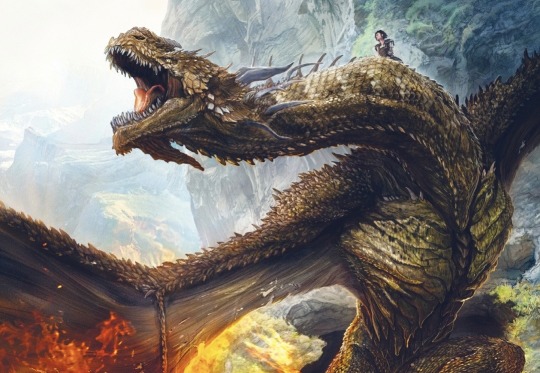
And to close: Nettles isn’t confirmed to be of royal blood, but she is embodiment of House Targaryen’s ideology of being gods amongst men.
#nettles f&b#asoiaf nettles#asoiaf#a song of ice and fire#nettles#nettles asoiaf#nettles and sheepstealer
59 notes
·
View notes
Text

end of the year yes sir yes sir.
as always id say the rows are more exact than the actual rankings but some of the edge ones are iffy.
sadly i did not finish metaphor in time- ill likely finish it within the next week though. if i had finished metaphor in time (and if the ending doesnt suck shit out of nowhere) it would have been third. i respect it alot more than P3R- and though i have a list of complaints i thought metaphor was a wonderful game
playing killer7 was crazy!!!! i knew i had to play after seeing the cloudman cutscene and it really did deliver. it made me feel like i was playing MGS2 for the first time again and i think thats the highest praise i could give a game. in another world where MGS2 wasnt the first game to really get me into the medium- killer7 would have been my favorite game. absolutely timeless. incredible combat and i admire the way it jumps topic to topic and doesnt really offer true finality to a couple of its points.
chulip now thats an all timer 👆 very adorable video game i like that its mean to the player but also has a kind heart. for whatever reason my joykill spirit doesnt activate for chulip- and there probably is a bit to say on how it treats women- but its not the worst ever and the game is not too pushy about bothering her. very very good ending sequence. great gameplay loop
honestly i dont even think i like P3R much. it was just the first game me and alot of the people i know were excited about in a long time and i have really fun memories playing it and getting it on release. honestly i thought about it while writing this and ended up just making a backloggd review lol
not much to say about katamari. its one of those games for me. yeah i enjoyed it but i have so little to say so maybe i shouldnt rank it so high but i fuck with its vision alot.
SMT1 is not fun to play but i really do admire its existence and atmosphere. incredibly cool
i still have complex feelings about SMTVV since its everything i wanted but its also lame as shit. tao and yoko remind me of ariana and cynthia during the wicked press tour lowkey. also i think SMTVV got worse after metaphor came out and ATLUS started showing off some actually good dungeons
earthbound was alright honestly i dont feel strongly about it and if it didnt have its presentation and unique manner of speaking to the viewer it would be a 3/5
jack bros was actually good im not exaggerating
baroque was cool but also im not very into it- its a 4/5 out of respect for it
shadow of memories was crazy everyone go play shadow of memories
i honestly fucked with P1 alot in terms of style/vibes but theres not much more to say about it and the story and characters arent special
gitaroo man was hard as shit but the music was fun
the parappa 2 music was fun but gitaroo man had more swag
i do not care about hypnospace sorry everyone.
im not the biggest fan of P2IS and P2EP just felt like a worse version of P2IS so i was never gonna be really into it. i do admire its vision and i think its pulling off what FFVIIR is trying to do better- but still not good
i respect the answer- but i just do not like P3 combat. a game of just P3 combat is going to fall flat for me. and honestly for a game about death (P3)- maybe there shouldnt be an answer.
dragon warrior was cute but i cant really give it high praise. for its time- great revolutionary. now? its alright.
i hated LIVE A LIVE that shit sucked
5 notes
·
View notes